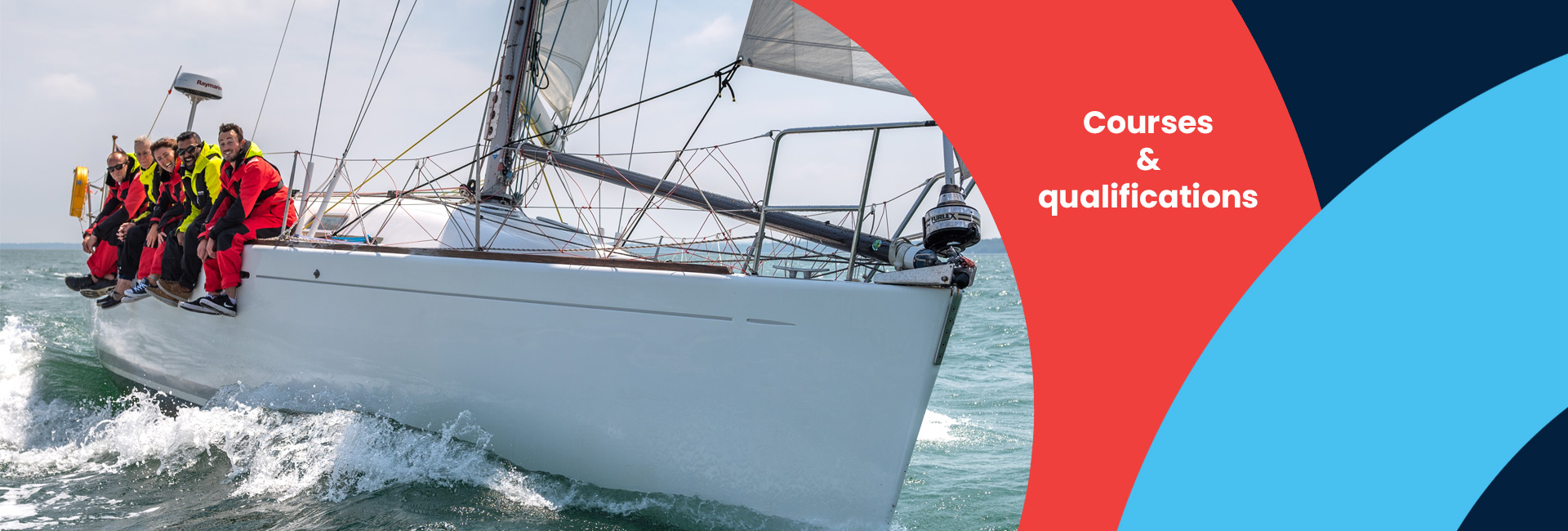

Popular courses
From beginners to professionals, there's something for everyone. Explore our most popular courses or browse by activity.
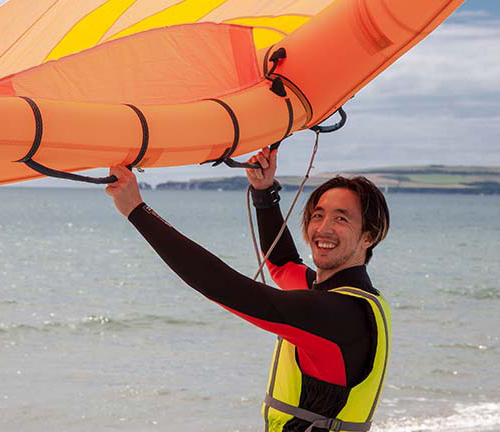
RYA Learn to Wingsurf
Get started in winging! In as little as four hours you'll learn how to fly the wing ashore and afloat, building your confidence on the water.
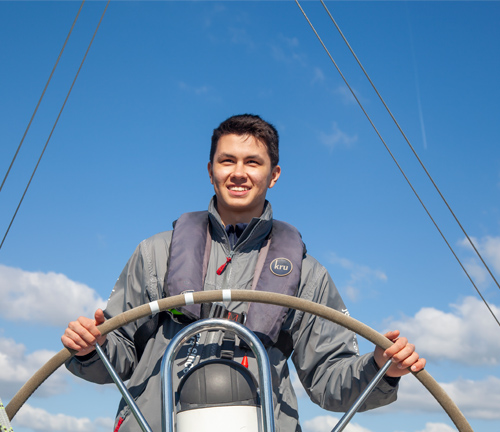
RYA Day Skipper
Make the transition from crew to skipper, developing the practical skills and confidence to take command of a small yacht.
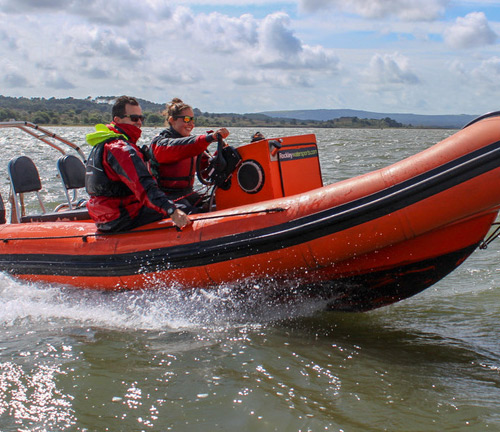
RYA Level 2 Powerboat Handling
Get to grips with the basics and learn how to master the waves with this two-day entry level course.
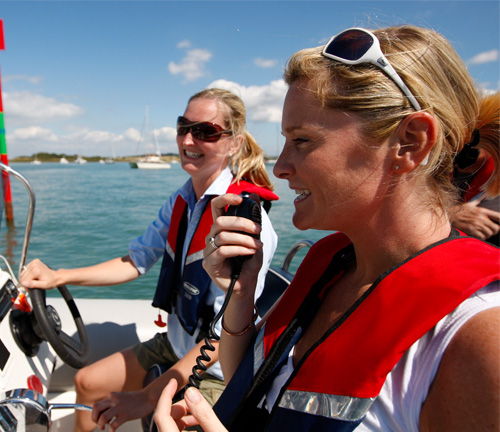
RYA Marine Radio (SRC)
If you have a VHF radio onboard your boat, or carry a handheld VHF whilst out on the water, you need to hold an operator's licence. Get qualified with our one-day course and exam.
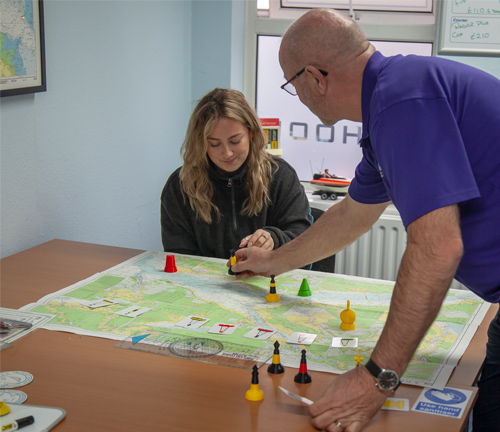
RYA Essential Navigation and Seamanship
Learn the basics of navigation, tides, charts and safety awareness in just two days in the classroom or eight hours online.
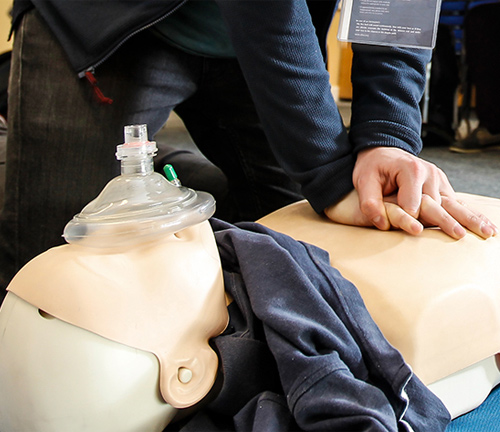
RYA First Aid
Our one-day first aid course has been specifically developed for water users and covers everything from CPR and head injuries to cold water shock.
With more than 100 courses to choose from, there's something for every age, ability and interest.
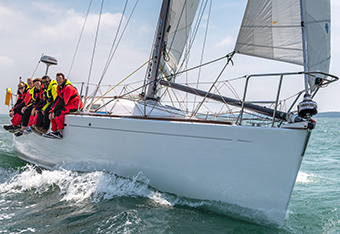
Instructors, coaches and careers
Looking for more information about becoming an RYA Instructor or Race Coach? Or want to turn your passion into a career on the water? Here’s everything you need to know.
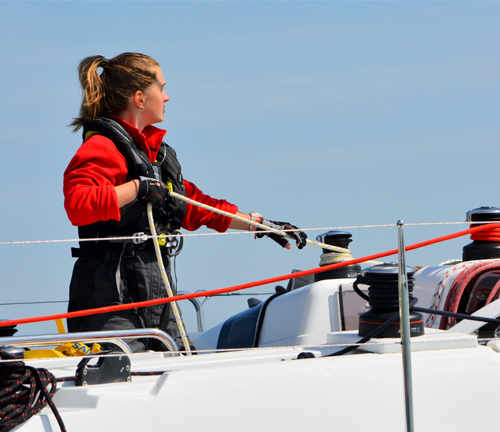
Professional qualifications
If working on the water is your livelihood you need the right training. RYA qualifications are the tickets to your success, so start your career as you mean to go on.
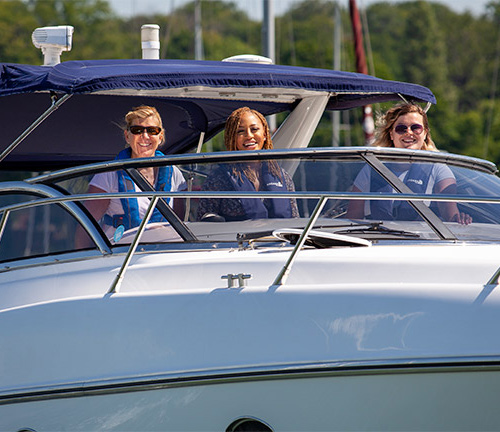
Careers advice
Whether you’re after a career on the water or ashore, the marine industry offers opportunities all over the world.
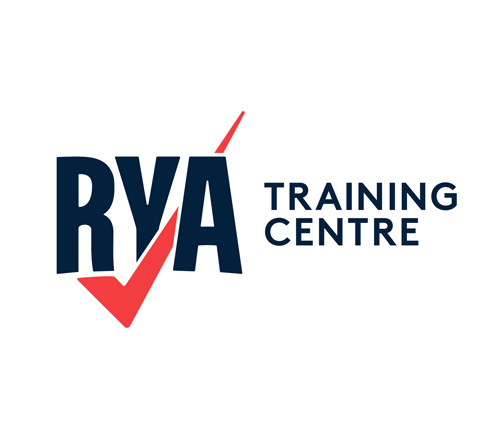
RYA recognition
Be a part of the world's leading training programme for recreational and professional boaters and join our network of more than 2,400 recognised training centres worldwide.
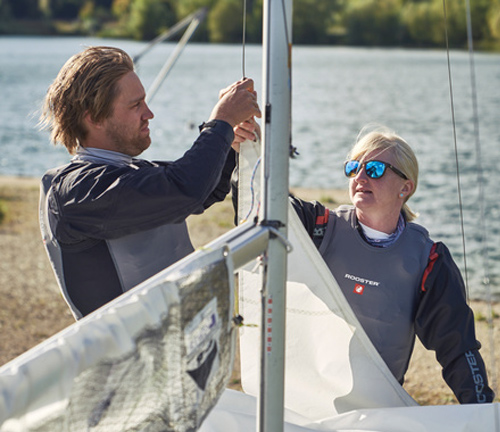
Love an outdoor office? The chance to shape and inspire future boaters? Then join our talented crew and become an RYA Instructor.
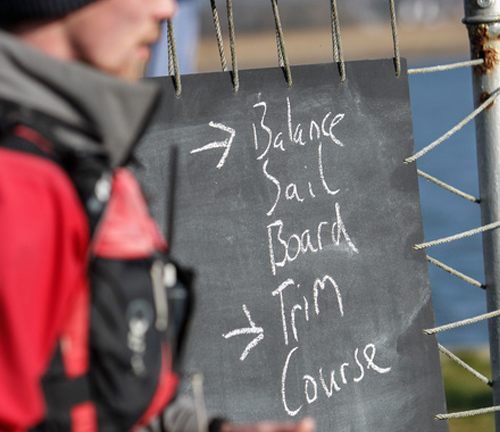
Race coaching
Get into race coaching and help keep Great Britain the world's greatest competitive sailing nation.
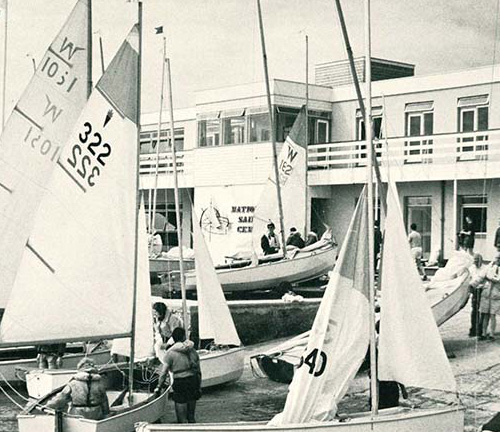
Learn about our heritage
We've come a long way since the introduction of the RYA Dinghy and Coaching schemes in 1970.
- Certificates of Competence
From RYA Yachtmaster® to Advanced Powerboat, RYA Certificates of Competence are the ultimate aim of aspiring skippers. Find out more about the required experience and book your exam.
View your RYA certificates online by registering for a free MyRYA account.
Entry Level Yachting Qualifications
Essential courses to kickstart your yachting career.
IIf you are looking for a job in the yachting industry for the first time, certain training courses are essential and others are highly desirable in the eyes of potential employers. We offer a full range of entry-level training courses in Antibes and Palma.
The five-day STCW Basic Safety Training package comprises the MCA-accredited modules: Personal Survival Techniques, Fire Prevention and Fire Fighting, Elementary First Aid and Personal Safety and Social Responsibilities. Together, they form an essential programme of pre-sea training necessary for working on board.
- STCW Basic Crew Training
After mastering the basics, it's time to explore additional courses to enhance your skill set and take on more responsibilities in your career. Some of these courses include:
- Power Boat Level II: Develop your boat handling skills, learning essential techniques like turning, mooring, and anchoring This certification will enhance your professional qualifications, in particular for those that may be involved in tender operations onboard.
- Engineering Courses: For those interested in starting a career in the engineering department onboard, the Approved Engine Course 1 (AEC1) and the Approved Engine Course 2 (AEC2) will expand your technical knowledge base and introduce you to the maintenance and servicing of engines onboard.
- Security Courses: Proficiency in Security Awareness (PSA) provides an introduction to security on board and Proficiency in Designated Security Duties (PDSD) is intended for seafarers taking on security duties on board.
- Find useful information to help you start and pursue a career in the superyacht industry.
- For more information on these courses, do not not hesitate to contact us

How To Get Qualified With Sailing Courses – RYA, ASA, IYT
Getting out on the water for the first time can be a daunting task, and navigating through the range of sailing courses and qualifications can be overwhelming. In this blog, we are going to explain the different yachting schemes available around the world (ASA, RYA etc), the qualifications they can offer, and discover the best path for you.
This applies to anyone wanting to sail or motor any yacht under 500 tonnes, most yachts are only around 10 tonnes!
Do I Need Sailing Qualifications/Licences?
If you keep your boat in the UK, only sail in the UK, and your boat is under 24m long, then no, technically you don’t. However, if you want to charter a boat, sail anywhere else in the world, or want to keep your insurance renewals low then a qualification or two is essential!
Finally, it’s not just about the licence, do you really want to take out your pride and joy, that probably cost 10’s if not 100’s of thousands, and try your luck? There is a lot of training and knowledge involved in becoming a skipper and working towards a qualification is the best approach to gaining the skills and knowledge.
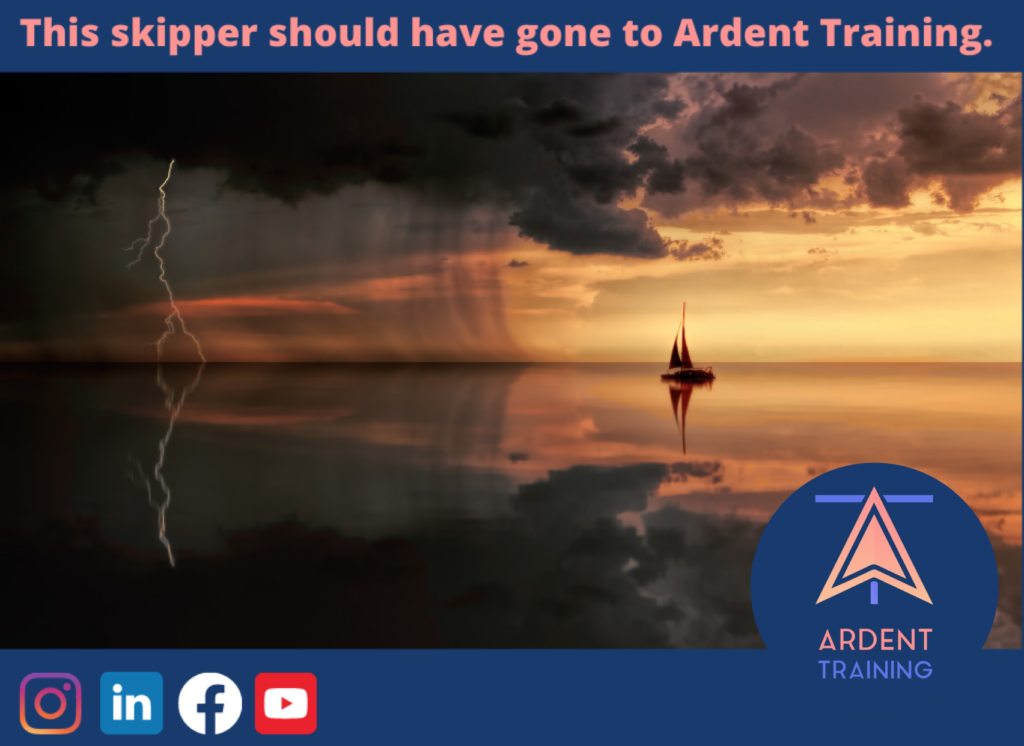
How To Get Qualified
We have decided it is a good idea to get some qualifications, now how do we achieve them? Before picking a school or instructor, you first have to look at which association they belong to. There are many to choose from as most wealthy countries have their own associations with their own qualification schemes. Once an association has been picked we can start looking at the appropriate qualifications, and finally, the schools that teach those qualifications.
RYA vs IYT vs ASA
Every qualification has to have an authorising body or association. You would be forgiven for thinking that just picking the most local yachting or sailing association is the way to go, but sailing is an international sport and hobby. Yachts can take us all around the world and we wouldn’t want to limit our future selves by obtaining the wrong certificate. The three biggest associations are Royal Yachting Association (RYA), International Yacht Training (IYT) and American Sailing Association (ASA) so let’s start by looking at those.
Royal Yachting Association
The RYA is the oldest and most internationally recognised governing body of dinghy, yacht, and motor cruising in the world. They were the first association to standardise training in the yachting industry and they have been going strong for nearly 150 years.
The RYA is equally focused on recreational boating as it is on professional boating which makes their qualifications particularly versatile.
Once you gain the RYA Day Skipper certificate you can easily convert it into either an ICC (international certificate of competence) which is free to do for RYA members or even get it commercially endorsed as a professional qualification without having to repeat any exams. The same can be said for the subsequent RYA Yachtmaster qualifications. This versatility and global reputation make the RYA qualifications a difficult route to beat.
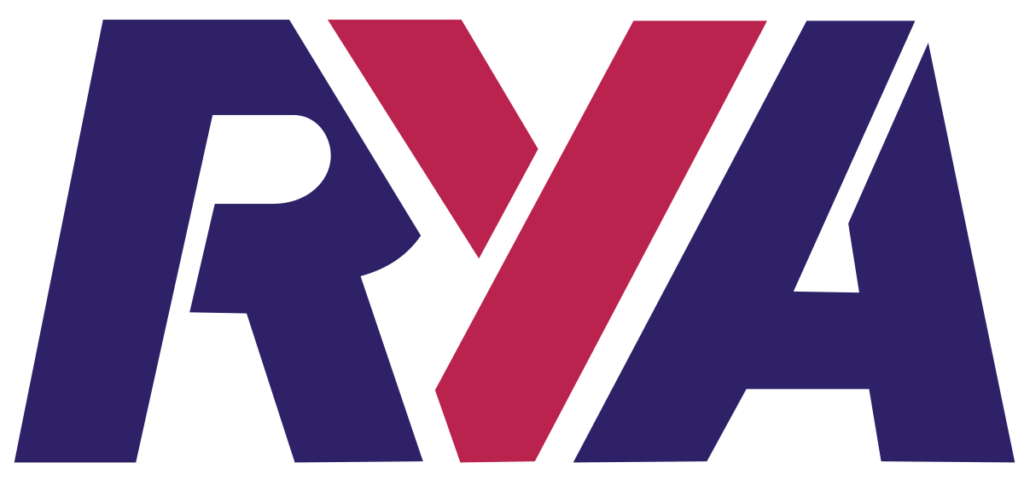
International Yacht Training
IYT is a relative newcomer and was founded in 1998. Despite being a relatively new organisation, it has made quite an impact and shaken up the yachting industry for the better. International Yacht Training forced the RYA to take a more international approach to their training and the International Certificate of Competence (ICC) was actually created by International Yacht Training. However, the RYA rapidly got on board with this and now offers the ICC to holders of its own qualifications without any further or retesting required. Put simply, you can easily convert RYA qualifications to IYT qualifications, but cannot convert IYT to RYA.
You would expect there to be a strong rivalry between these two organisations but instead, they appear to work well together and have both worked to make the ICC the internationally recognised qualification it is today.
The IYT also have a good offering of professional qualifications, allowing their holders to work in the industry and arguably offer the best set of qualifications for those wishing to go on to working on superyachts. IYT are without a doubt a well-regarded association worldwide, but despite this, these newcomers are much less well known than the RYA and have far fewer training centres around the world, making their qualifications harder to obtain.

The ASA is the most prominent sailing association in America. They are solely targeting recreational sailors and have a well thought out approach to this market. Whilst they are less well known internationally, and they don’t offer the same options to progress into professional sailing, they do offer a good alternative to the ICC called the International Proficiency Certificate (IPC). Officially, the IPC is the only recognised yachting ticket in the USA when it comes to chartering boats, however, in reality, the ICC will usually be accepted.

If you only want to sail in the USA, the ASA will probably do. However, for the most versatile qualifications, internationally recognised, for recreation and professional use, as well as the easiest to find training centres for, is, without doubt, the RYA. I chose the RYA when I learnt to sail and it has never once held me back from all my adventures. On the other hand, I have met many sailors who gained other qualifications elsewhere (ASA, IYT, SA Sailing, Australian Sailing, etc…) who have had to retest at some point to get their RYA tickets.
The RYA wins hands down.
RYA Cruising Scheme – Day Skipper to Yachtmaster
Okay, so RYA it is, but which RYA course should you start with?
The RYA offers many courses from complete beginner courses to celestial navigation courses. Where you start really depends on your prior experience and what you want to achieve. This diagram outlines the progression and entry points into the RYA Cruising Scheme:
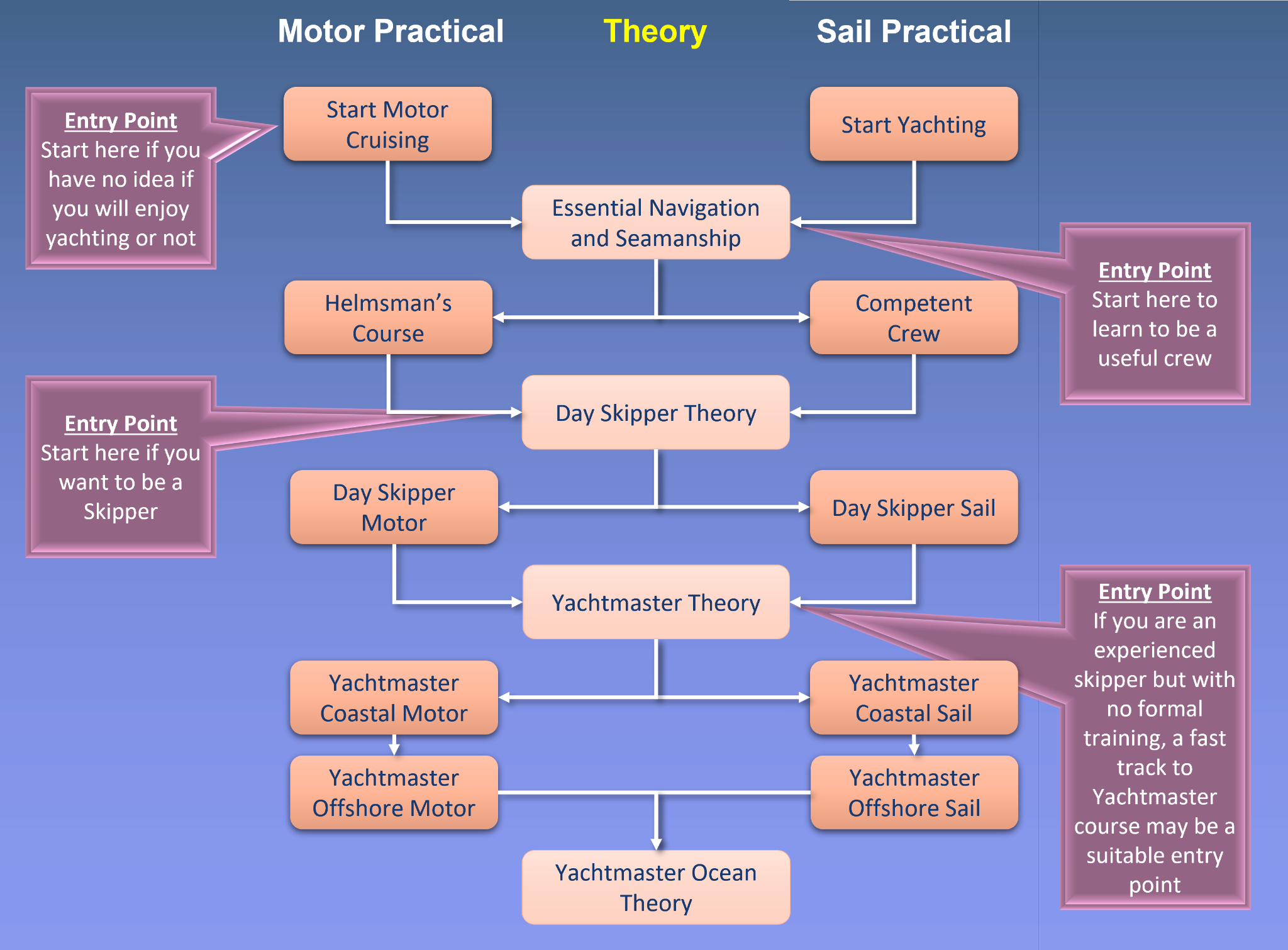
Up until Day Skipper, you can really jump in at any point depending on your ambition. However, once you reach Day Skipper Practical, each course assumes you have a certain amount of prior experience and knowledge, usually exactly equivalent to the course that came before it. Watch out when trying to jump or skip courses from Day Skipper Theory and onwards as you will often get caught out by your fragmented knowledge and either downgraded or simply fail the course.
There are lots of courses to suit your needs and lots of different entry points depending on our experience. If it seems a bit overwhelming we can make this simpler if we ask the question: Why do you want to take a course?
If you just want to try out being on the water for the first time, go for Start Yachting, or Start Motor Cruising.
If you want to learn to be a useful crew, start at Essential Navigation and Seamanship.
If you want to learn to be a skipper, start with Day Skipper Theory.
If you are already an experienced yachtsman and want qualifications to back it up, start with the Fast Track to Yachtmaster.
Choosing An RYA Sailing School
Finally, we know what course we want to take, now we just need to find somewhere to take it! The RYA has over 2,500 recognised training centres around the world. That’s a lot to choose from! Luckily, we are here to help make the right choice for you.
RYA Theory – Online Vs Classroom
There has been a recent shift from classroom learning to online learning. We did a lot of research into this and found the benefits of online learning to be so great that we have fully switched over to this medium and embraced e-learning. We believe we can provide a much better quality theory course with the aid of technology and are proud to be producing some of the best-prepared students for their practical training. By removing the need for travel and the cost of premises and accommodation, we have found we can offer a tailored experience for each of our students at a far more reasonable cost.
We actually wrote a whole blog on Online Vs Classroom courses so if you want to find out more, I urge you to check it out: Can You Really Learn to Sail Online ? Or, if you are already sold on the idea of an online course, head on over to our website and give our Free Trial a go .
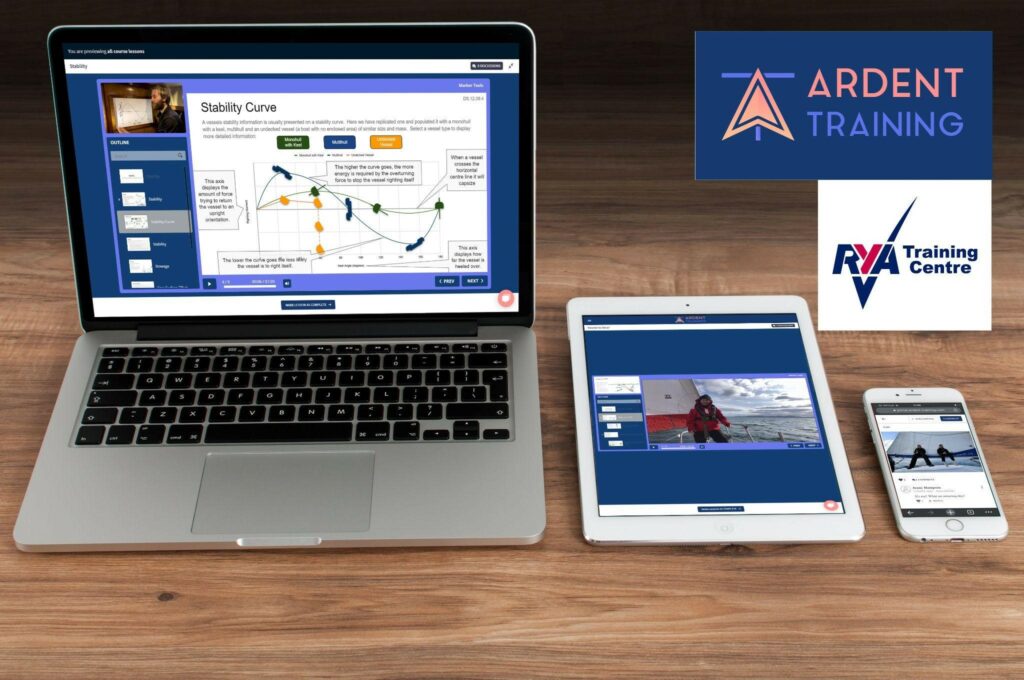
RYA Practical Centres
There are a lot of factors to consider when choosing a practical centre, first and foremost, where do you want to sail? Some people just want somewhere local, some want adventure, and some want sun. Think carefully about where you want to sail and make a holiday out of your practical course in the right location.
Once you have a location in mind, time to start searching. There will no doubt still be multiple options but remember, cheaper is not better! There isn’t a large profit margin on RYA courses, so if a training centre is cheap, they are probably cutting corners. The first corners to cut are instructor wages and vessel maintenance so getting a cheap course may just result in your hard-earned money getting wasted on inexperienced instructors and poorly maintained vessels. This is not worth the savings as it will severely impact your enjoyment and how much you can get out of the course.
Armed with that advice, we recommend using the RYA’s Find a Training Centre tool to help you find the best training centre for you: https://www.rya.org.uk/wheres-my-nearest
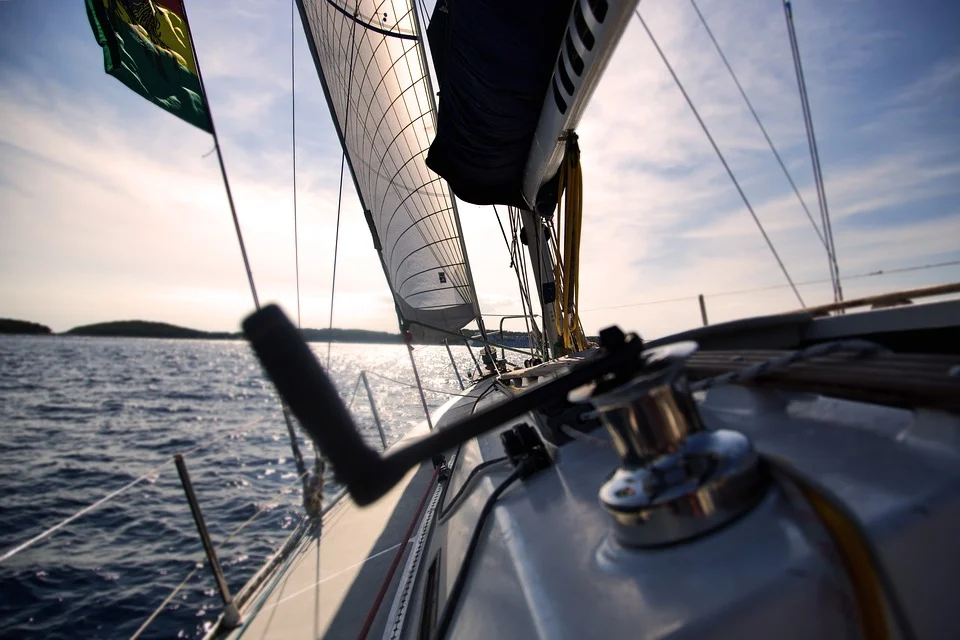
So, what have we learned?
- You need qualifications to charter a boat.
- Qualifications will lower your insurance premium.
- Qualifications will help you learn, stay safe, and enjoy your time on the water.
- Go with RYA qualifications for maximum versatility and recognition.
- If you want to be a Skipper, you need the RYA Day Skipper certificate.
- Take your theory courses online with Ardent Training.
- Choose where you want to learn to sail (in the sun or somewhere close to home?)
- Go quality over price to get more out of your training.
If you want any more advice, you can always contact one of our team at Ardent Training. Just drop us an email at [email protected] or give us a call on 01688 325025.
If you can’t wait to get started, check out our Free Trial of our RYA Day Skipper online theory course.
Releated Posts

How to Join a Yacht Delivery as Crew: Building Sea Miles and Gaining Experience
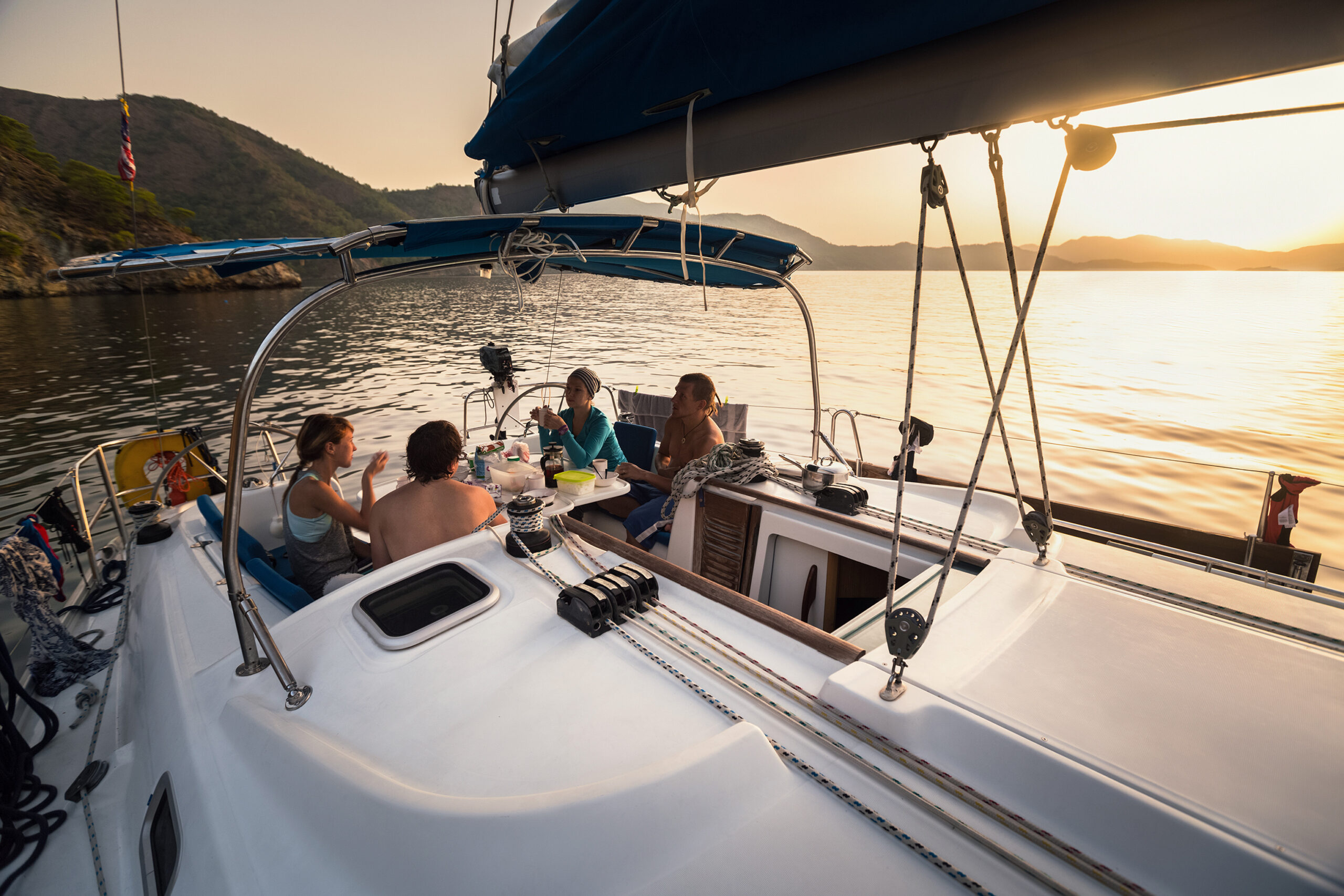
Is It Safe To Sail With Kids?
I am not sure where you’re getting your information, but great topic. I needs to spend some time learning much more or understanding more. Thanks for excellent info I was looking for this information for my mission.
Your Comment*
Save my name, email, and website in this browser for the next time I comment.
What crew training do I need to work on a superyacht?

With thanks to IMSA and JPMA - John Percival Marine Associates (Hoylake Sailing School)
The superyacht industry is an exciting and rewarding choice of employment. However, quality superyacht crew training courses are essential, and often required, for life on board.

Whether it’s your first job in the maritime industry or you’re looking to progress in your yachting career, the right crew qualifications ensure crew members hold the essential skills that may be needed in an emergency at sea.
Understanding the required yachting qualifications for any given role on board a superyacht can be a daunting task. With this in mind, we have compiled a list of qualifications and specialist courses to help you understand the necessary superyacht crew training for different roles on a yacht.
Required yacht crew training and certificates
If you plan to work as a crew member on a superyacht, you must obtain two mandatory certificates to get on board:
- ENG1 Seafarer Medical Certificate
ENG1 Seafarer Medical Certificate is a UK medical examination to prove you are fit to work at sea. An MCA-approved doctor must issue all applicants with an ENG1 Medical Certificate or equivalent.
Learn more about the ENG1 here, or find an MCA-approved doctor in your area.
- STCW Basic Safety Training
STCW Basic Safety Training is a mandatory qualification for all crew hoping to work on a commercial or charter yacht larger than 24 metres (78 feet).
Learn more about the STCW here, or find an STCW crew-training provider here.
Superyacht job roles: What am I qualified for?
Yacht deckhands.
Fancy finding courses to work on the deck of a superyacht? You've come to the right place.
A deckhand is an entry-level role for employment aboard a superyacht. A sailing qualification is not essential, but will always be preferred. It will help you to stand out among the competition.
The minimum requirements for a job as a deckhand are the STCW Basic Safety Training and ENG1, however a solid deckhand will also be armed with the following skills and certificates:
- RYA Competent Crew
- MCA Proficiency in Designated Security Duties (PDSD)
- RYA Powerboat Level 2
- RYA Tender Operator or IYT tender driving license
- PWC Personal Watercraft Proficiency
- General GRP and carpentry repairs
Yacht stewards/stewardesses
A steward or stewardess’s priority is to look after the guests and the interior of the yacht. In most cases, there will be a chief stew who will lead a number of assistant and junior stews – a great entry-level pathway into the industry.
The minimum requirements needed to work as a stew are the STCW Basic Safety Training qualification and an ENG1 Medical Certificate. However, a good stew will be keen to progress and could therefore potentially be trained with the following certificates:
- An interior yacht crew training course or courses, such as the PYA GUEST Program
- STCW Proficiency in Medical First Aid
- STCW Proficiency in Survival Craft and Rescue Boats
- VHF Radio Short Range Certificate (GMDSS/DSC)
- MCA Human Element, Leadership and Management (HELM) at Operational Level
Learn more about yacht stewardess training courses and progression .
Yacht chefs
Yacht chefs are responsible for purchasing and preparing high-quality food for both the crew and guests. In terms of qualifications, experience is key – having a good history of creating wonderful dishes is essential, whether it’s gained from working in a hotel or on board a previous vessel.
Alongside STCW Basic Safety Training and ENG1, yacht chefs must complete the Ships Cook Assessment if cooking for 10 or more crew members. Most chefs should also have the relevant health and hygiene certificates. These include a Level Three Diploma in Professional Cookery, and the HABC Level Two and Three.
First mates/chief officers
The first mate/chief officer is the captain's right-hand man or woman, in charge of the deckhands and other exterior crew members. Mandatory requirements include an Officer of the Watch certificate for yachts less than 3000GT.
An extensive background on deck will be necessary, and a number of qualifications would also be beneficial for this role, including:
- RYA Yachtmaster Offshore or IYT Master of Yachts <200gt
- RYA Yachtmaster Ocean or IYT Master of Yachts <200gt Unltd
- Master (code vessels) <200gt CoC
- OOW (Yachts) <3000gt CoC
- Chief Mate (Yachts) <3000gt CoC
Yacht engineers
Maybe you want to find engineering courses for working on board? Here's what you need to know about the job of a superyacht engineer.
The role of the yacht engineer is well-rewarded and highly sought after. The engineer will manage the inner workings of the boat, ensuring all systems are running smoothly and carrying out maintenance and repairs when needed.
Yacht engineers usually begin their career by obtaining their STCW Basic Safety Course and ENG1 Medical Certificate. Experience can be gained or taught on the job whilst working towards Small Vessel EOOW (Engineer Officer Of The Watch).
Find out more about training and progression for yacht engineers .
Captains or masters
The yacht captain is the leader of the vessel. To become a captain, you must possess extensive experience working on board boats, considerable training and a number of qualifications.
However, it’s not uncommon for a captain to have the majority of the following:
- Master (Yachts) <500gt CoC
- Master (Yachts) <3000gt CoC
A substantial background as a first mate/chief officer is typically expected, along with budgeting, navigation and insurance experience, and some knowledge of engineering.
The captain must also be personable and very skilled and comfortable leading a team. He or she will have to deal with the crew and guests of the boat on a daily basis, who, in the majority of cases, will be very influential people who are used to exceptional levels of service. It's also important to have a basic understanding of the legal aspects of working on a yacht .
What to look for in your yacht crew training provider
Crew trainers should be approved and accredited, abiding by the strict guidelines in the industry, and Certificate of Competency’s (CoC’s) from all over the world are accepted on many yachts. However, although they are not the only ones used in yachting, UK MCA (Maritime & Coastguard Agency) CoC’s are regarded as more superior.
Your crew training centre should be able to demonstrate to the MCA that training will be delivered under the supervision of personnel who have a thorough knowledge of the practical application of modern methods, systems and procedures.
IMSA, a specialist in worldwide ISPS Code maritime training, sheds some light from their perspective, “The most important aspect of the trainer is that he/she must be able to demonstrate total knowledge of the subject matter, and have the relevant practical and commercial experience in the subject and operations of vessels to impart that experience to the delegates so that they benefit from both the theory and the experience".
The information above should be helpful as you set about embarking on a career in yachting, or if you're looking to advance your career on board. Remember, there's no such thing as too much training, so if you regularly look to add a new skill or qualification to your crew CV it will stand you in good stead in the long run.
Search for certified crew training providers before you embark on your crew career. You can find more invaluable information and advice in our crew articles.
Tried & Tested

In the realm of maritime luxury, the quest to offer yacht charter guests the perfect night's sleep has become an art form, one which luxury bed and linen supplier, CC Design, has fully committed to.
A jacket completes any crew member's uniform so it's an important garment to get right. In this Tried & Tested, Sea Design pits eight popular jackets against one another to determine which one is best for superyacht crew in 2023.
iAQUA creates high-performance, technologically advanced underwater scooters. In this Tried & Tested, a team of experienced testers have rated and reviewed the AquaDart Pro and AquaDart Nano series to reveal the stand-out iAQUA sea scooter.
Boero YachtCoatings, a leading brand of paint solutions for superyacht protection and maintenance, has taken a significa...

Yacht bedding specialist CC Design is producing what it believes to be the world's most luxurious tailored duvet for cli...

Popular Articles
Finished reading now find your perfect supplier..
Search our industry-leading directory for over 20,000 superyacht suppliers, providers and marinas.
Essential Guides
Ocean Mapping
New to Yachting
ESSENTIAL YACHT QUALIFICATIONS
Qualifications required to work on board a yacht.

All crew, regardless of their position on board, need to have completed the STCW Basic Safety Training along with obtaining a recognised Seafarers medical certificate, the most popular being the ENG1 which is issued by an MCA ( Maritime and Coastguard Agency ) professional medic.
Without these two certificates, a yacht crew recruitment agent cannot assist you in finding work onboard a yacht .
STCW Basic Safety Training
STCW is a one week long course that provides students with an important introduction to working at sea and the necessary safety knowledge.
STCW stands for ‘Standards of Training, Certification, and Watchkeeping’ and is required for all crew who are working onboard commercial ships or superyachts.
The course teaches the basics of staying safe at sea and it comprises of 5 modules:
Personal Survival Techniques
Fire Fighting and Fire Prevention
Elementary First Aid
Personal Safety and Social Responsibility
Proficiency in Security Awareness
The STCW certification is valid for 5 years from completion of the course, and after that you are required to take an STCW Refresher Course in Fire Fighting and Sea Survival . So, prior to looking for work onboard a yacht, you must make sure all your certification is up to date.
The good news is that there are training centres all around the world where you can complete the STCW course and obtain your certification. Research online to find the nearest centre to you and get started. The course takes 5 days to complete so make sure you have accommodation nearby.
It's also important to ensure that your certificates are issued in English and that the course is certified either by MCA or the national maritime organisation of the country where you take your course.
Seafarers Medical Certificate
Seafarers Medical Certificate is a medical test performed to establish whether your health and your level of fitness allow you to work at sea. The most popular Seafarers Medical Certificate is ENG1 which is issued by an MCA approved doctor but you can also get an equivalent counterpart test in your country.
ENG1 is valid for two years so you will have to make sure to renew it regularly before it expires. Always keep an eye on your expiry dates because, as yacht crew, you might find yourself in the middle of the season with no way of renewing it instantly.
Without a valid Seafarers medical certificate, it is illegal for you to stay and work on board, so always make sure your certificates are up to date.
You can research online to find a medical professional certified to issue a Seafarers Medical Certificate near you.
See the list of MCA approved doctors based in the UK . See the list of MCA approved doctors outside of the UK . See the list of Countries whose seafarer medical fitness certificates are accepted as equivalent to the UK ENG1.
There are two essential certificates all yacht crew need to have to be able to work on board a yacht, regardless of their role.
Other essential guides.

What you need to know about B1/B2 visa

Download yacht crew CV templates

How to write a memorable yachting CV

How to prepare for a yacht interview?

What are the two main yachting seasons?

Big yacht crew hubs you should know about

Is yachting the right choice for me?

Yacht crew salary guide
Explore yacht roles
Are you ready to find your new ideal job on board a yacht.
Become a member of YPI CREW and connect with our recruiters so they can guide you through your job search.
Each of our recruiters is specialised in crew placement for a particular department and they will do their best to get you an interview on board a yacht. They will also advise you on how to best present your experience and skills and prepare for a yacht job interview.
Explore the latest in yachting

- 12 hours ago
Open Yacht Crew Jobs In April 2024

YPI CREW Will be Attending the Superyacht Technology Network Conference in Barcelona

Is a career in the yachting industry a good fit for me?

YACHT CREW GUIDES
Learn about different positions on board a yacht.

YACHT CREW SALARY GUIDE
Let’s get started. call us on +33 (0)4 92 90 46 10 or email us., our mission, vision and values, mlc 2006 compliance, essential guides, yacht crew positions.
Chief Officer
Second Officer
Third Officer
Chief Engineer
Interior Crew
Head of Service
Head of Housekeeping
Specialist Positions
Spa Manager
Spa Therapist
Personal Trainer & Yoga Instructor
Hairdresser
Mandatory Certificates
B1/b2 visa information, how to write a memorable cv, how to prepare for an interview, yachting seasons, yacht crew salary guide, is yachting the right choice for me, cv templates, ocean mapping, new to yachting.
+33 (0)4 92 90 46 10
The Essential Guide to Yacht Crew Certifications
- by yachtman
- September 7, 2023 August 26, 2023

Yacht crew certifications are a must for anyone looking to take on a career in the luxury yacht industry. These qualifications give individuals the required skills and knowledge to make sure passengers onboard have a safe and comfortable experience. Whether you want to be a captain, deckhand, engineer or stewardess, getting the right certifications is key.
The most important certification is STCW (Standards of Training, Certification and Watchkeeping) . This certification sets global standards for seafarers and covers topics such as firefighting, first aid, personal safety and social responsibility. It’s a must-have for all yacht crew members and shows a commitment to safety and professionalism.
In addition to STCW, there are other certifications which can improve your job prospects in the luxury yachting industry. Deckhands and officers can get RYA (Royal Yachting Association) courses such as navigation, radar operation and seamanship. These courses not only give valuable knowledge but also demonstrate to employers you’re serious about your craft.
For those wanting to become a stewardess or chef on a luxury yacht, there are special certifications. The PYA (Professional Yachting Association) has courses in interior training, wine appreciation and silver service dining. These qualifications show your expertise in giving top-notch hospitality services onboard.
Certifying seafarers has been going on for centuries. Back then, certificates were issued by shipowners or guilds as proof of competence in particular tasks like rigging or steering. Now, these certificates have developed into globally recognized qualifications which verify an individual’s abilities as a yacht crew member.
In conclusion, having yacht crew certifications is vital for anyone aiming to succeed in the luxury yacht industry. These certifications not only give you the skills and knowledge you need, they also make you stand out in a competitive job market. Thus, if you’re thinking of a career at sea, investing in these certifications is a smart move which will open up lots of opportunities.
Importance of Yacht Crew Certifications
Yacht crew certifications are vital for safety and professionalism. These credentials prove knowledge and skills, allowing crew to handle emergencies well and hit the yachting industry’s high standards.
Getting certifications shows commitment to personal growth and boosts job prospects. Employers prefer candidates with qualifications as they guarantee competence and compliance with industry laws. Well-trained crew help a yacht’s success and reputation.
Certifications cover navigation, safety, firefighting, medical care, hospitality, and more. Each focuses on skills needed for different roles, so crew know their duties and can perform them properly. These certs also validate crew members. They set a standard of knowledge in the yachting world, leading to respect and trust.
One example of certification importance is a transatlantic crossing with an engine room fire. Thanks to crew training in firefighting and emergency protocols, they put out the fire quickly and avoided further damage or injuries. Certifications prepare crews for tough sea situations.
Types of Yacht Crew Certifications
Yacht crew certifications are a must for those wanting to work in yachting. They demonstrate skills and professionalism. Let’s look at the types of certifications:
Plus, there are other courses for deckhands, engineers and more.
These certifications have changed over the years. Safety and quality needs have led to standardized training. They are now widely recognized and often required by yacht owners and charter companies.
Knowing the certifications helps crew members decide which to get. It can help them succeed in their roles. Acquiring these qualifications is key for a successful career in yachting. STCW certification, chef certifications – all these credentials are very important for a yacht crew member.
Requirements for Yacht Crew Certifications
If you want to work in the exciting world of yachting, you need to get certified. There are certain needs for this. It varies depending on the certification and job you’re aiming for.
Here’s a breakdown of the necessary requirements for yacht crew certifications:
Remember a few more things too. You must do the courses from an accredited institution. Make sure to have a valid passport and seafarer’s medical certificate.
Pro Tip: When getting certified, gain practical experience via internships or volunteer work on boats. This will sharpen your skills and make you look better than other applicants.
Process of Obtaining Yacht Crew Certifications
For those wanting to work in the yachting industry, gaining yacht crew certifications is a must. These certifications prove competence and guarantee the safety of passengers and crew. Here’s a guide on how to get them:
- Research : Find out what certifications are available, such as deckhand, stewardess, engineer, and captain. Make sure you understand the requirements of each and which one is best for your goals.
- Training : Once you’ve decided, enroll in training programs for the certification. These programs will give you the knowledge and skills you need.
- Practical Experience : Gain practical experience on yachts or vessels. This will help you prepare for the certification exams.
- Examinations : Pass the certification exams. These will test your knowledge and ability to do tasks related to your role.
- Certification Issuance : Once you pass, you’ll be given your yacht crew certification. This shows you’re qualified and lets you work legally in the yachting industry.
Remember to research each certification program thoroughly as there may be more requirements or steps involved.
Benefits of Yacht Crew Certifications
Yacht crew certifications offer numerous advantages, improving the skills and capabilities of crew members. These certifications give career advancements, safety, and professionalism.
- Knowledge Upgrade: Certifications make crew members aware of their roles, navigation, safety procedures, and emergency protocol.
- Credibility: Certifications on resumes show commitment and dedication to the industry.
- More Job Opportunities: Certifications open doors to job opportunities in the industry and internationally.
- Safety: Security training ensures crew members can handle emergencies and react quickly.
- Networking: Certification programs let crew members connect with experienced people.
- Career Advancement: Certifications help advance a career in the maritime industry.
These certifications not just improve individual skills, but also passenger satisfaction. Investing in learning and certification programs keeps excellent standards of service and safety during voyages.
For maximum benefit:
- Stay Updated: Get advanced certifications, attend seminars, and go to conferences.
- Specialization: Gain certifications in special areas like hospitality, event planning, or culinary arts.
- Showcase Certs: Put certifications on resumes or professional profiles.
Prioritizing yacht crew certifications and following these tips gives many possibilities in the maritime industry. Learning and professional growth are essential for success and ensuring safety, service, and satisfaction on luxury yachts.
Career Opportunities with Yacht Crew Certifications
Holding yacht crew certifications opens up a range of career opportunities in the maritime industry. These qualifications teach the skills and knowledge needed to work on luxury yachts and cruises. Let’s look at what jobs these certifications can offer.
There are also certifications less known. For example, getting a Food Hygiene Certificate shows you know how to keep cleanliness and food safety on board. This may help you get a job as a chef or stewardess.
Having customer service skills and knowing a foreign language can make you stand out for guest-focused roles like a purser or hostess.
Networking is an important part of finding a job. Connections with yacht owners, captains, and crew agencies can lead to job offers. Attending industry events and being part of professional associations, online and offline, can help.
To be successful in yacht crew employment, diversify your skills and gain experience outside of technical competencies. Remember to update your certifications and be open to learning.
Tips for Success in Yacht Crew Certifications
Are you ready to sail towards success with yacht crew certifications? Here are some tips to make sure you reach your goal:
- Research Certifications: Know the different certifications available and select the ones that match your career goals.
- Get Professional Training: Enroll in courses that focus on yacht crew requirements and gain the necessary skills and knowledge.
- Stay Up-to-Date: Check for updates regularly to make sure you comply with industry standards.
Plus, to increase your chances of success:
- Network: Connect with professionals, attend industry events, and join online forums.
- Gain Experience: Work on yachts, volunteer, or intern to get practical experience.
- Learn Continuously: Seek opportunities to develop professionally, such as workshops or conferences.
Success in yacht crew certifications requires dedication, passion, and a love for the sea. Follow these tips and get ready to embark on a rewarding maritime career!
We’ve reached the end of this guide on yacht crew certifications . It’s essential to have the right qualifications to do well in the industry. Certifications help equip people with the skills and knowledge they need.
It’s important to develop professionally. Yacht crew members should keep improving and stay up-to-date with industry trends. This could involve attending courses or workshops related to their area of expertise.
John is a great example. He already had certifications but he still chose to take a course on marine safety and emergency procedures . This extra knowledge boosted his confidence and impressed his captain and crew. It even helped him get promoted!
Frequently Asked Questions
Q: What is a yacht crew certification? A: A yacht crew certification is a qualification or endorsement that verifies an individual’s competence and skills in performing specific job roles within the yachting industry.
Q: Why do I need a yacht crew certification? A: Yacht crew certifications are essential for securing employment within the yachting industry. They provide proof of competency and increase your chances of getting hired by yacht owners and charter companies.
Q: How do I obtain a yacht crew certification? A: To obtain a yacht crew certification, you need to complete the necessary training courses and meet the requirements set by the certification bodies. These courses can be taken at recognized training schools or online platforms.
Q: What are some common yacht crew certifications? A: Common yacht crew certifications include STCW (Standards of Training, Certification, and Watchkeeping for Seafarers), ENG1 Medical Certificate, RYA (Royal Yachting Association) Certifications, and PYA (Professional Yachting Association) Certifications.
Q: Are yacht crew certifications internationally recognized? A: Yes, most yacht crew certifications are internationally recognized. However, it is important to check the specific requirements of the country you wish to work in, as some may have additional or country-specific certifications.
Q: How long does it take to complete a yacht crew certification? A: The duration of a yacht crew certification depends on the specific course and the level of certification. Some certifications can be completed in a few days, while others may require several weeks of training.
What is a Yachtie?
Before we go any further, let’s make sure we are all singing off the same hymn sheet.
A Yachtie is a broad term used to describe anyone who works on a yacht. More specifically, it has become the term for people working as yacht crew on superyachts.
A superyacht is a very large boat that is extremely luxurious and often owned by multi millionaires and billionaires.
These Yachties who work on superyachts hold a number of different positions. Most Yachties will start their superyacht career working as a Deckhand or Stewardess. With more experience and responsibilities, your role will change as you progress up the career ladder.
It’s worth noting there are other types of yachting and Yachties. The other kind of ‘Yachtie’ could describe those who hold their Yachtmaster qualification and have jobs like skipper charter boats.
Job roles for new Yachties
Yachties new to the industry (also known as ‘Green’ Yachties) will traditionally apply for entry levels roles, which are Yacht Deckhands or Yacht Stewardesses.
These are both very different jobs, so you need to be sure which one you want to do and start training for that career path.
Yacht Stewardess (Stew)
A Stewardess, or Steward , looks after the interior of the yacht. This means anything that happens inside the boat, you will be responsible for it.
Think of any job in the hospitality industry and then combine it into one role on a yacht, that is what you will be doing.
From making beds, doing the laundry, cleaning, serving food, and hosting dinner, you will do it all to a 5-star standard. Anything less than perfect, and your guests won’t be satisfied.
It’s the small things that make the difference between high standards and exceptional standards. You must have a great eye for detail and be able to make sure no stone is left unturned. Everything on board the ship must be 100% perfect at all times.
You will be reporting to Chief Stew, who will be your manager and give you your task list. After a good few seasons as a green Stewardess, you will have enough experience and confidence to apply for Chief Stewardess roles.
Yacht Deckhand
In contrast to the Stewardess role, Deckhands look after the exterior of the boat.
Predominantly a male role, Deckhands will do everything from general maintenance to cleaning the teak deck, looking after the toys (Jet Skis, etc.), and even driving the tenders.
Deckhands should know how a yacht operates, the basic terminology used onboard, how to tie knots, and loads and loads of enthusiasm.
Deckhands may also dip in and out of helping the Stewardesses, and it isn’t uncommon for Deckhands to give a hand during busy evening meal preparation and service.
5 steps to Becoming a Yachtie
With an understanding of the job roles available, you can now decide which one best suits you. With the right attitude, qualifications, and knowing where to look for work, becoming a Yachtie is achievable for anyone who wants it.
- Have the right attitude
- Pass an ENG1 medical
- Complete STCW Basic Safety Training
- Gain experience
- Go to a superyacht marina
1. Have the right attitude
Along with gaining the correct qualifications to prove your competence, to become a Yachtie, you must have certain characteristics to thrive in this industry.
Yachties have to be well presented, articulate, know how to take orders, and be able to work hard, all with a smile and enthusiasm. You have to be able to work incredibly long hours, sometimes under stressful conditions, without losing your patience.
Having a job on a superyacht may sound glamorous, but if it’s your 10th day working in a row and you’ve got your head stuck down a toilet trying to clean it, you may want to think again. To become a Yachtie, you have to be happy with spending a lot of time away from home without seeing your friends and family. This may all seem obvious, but this situation does not suit everyone, and without careful consideration of the negatives, you will leave this industry quicker than when you arrived.
2. Pass ENG1 Medical
The first actionable step you need to take to become a Yachtie is gaining an ENG1 medical certificate. The ENG1 medical is an examination by an approved MCA (Maritime and Coastguard Agency) Doctor to make sure you are fit and able to work at sea.
Every single person working at sea must have an ENG1 medical certificate , without this, you are not able to start working on superyachts. The examination will take around 45 minutes, during which the doctor will go through a checklist to make sure you have no underlying health conditions that may impact the safety of you or anyone else on board the ship.
The most common reason new yachties fail the ENG1 is colour blindness. Surprisingly many people can go through their whole life without knowing they are colour blind. However, on board a ship, this can have huge implications. If you cannot identify signals and lights correctly, it will be impossible for you to help navigate the ship in an emergency. Unfortunately, this means you cannot start work as a Yachtie.
3. Complete STCW Basic Safety Training
Another requirement for working at sea is completing STCW Basic Safety Training . Similar to the ENG1 you can only get a job on a yacht if you have the STCW certificate.
STCW stands for ‘Standards of Training, Certification and Watchkeeping’. It is to make sure that all Seafarers have an understanding of what to do in an emergency and are aware of the procedures required.
STCW Courses are action-packed and quite a bit of fun. From fire fighting to sea survival, you will get stuck in learning, and learn loads of new skills.
4. Gain experience
If you are lucky enough to have a job offer on a superyacht, then having your ENG1 and STCW certificates will be enough.
Don’t worry if you haven’t already got a job offer, it’s quite normal to go through all these steps and not have a job lined up yet. If this is the case, gaining more experience and qualifications is a good idea to give you a competitive advantage over anyone else applying for the same job role.
This is achieved through signing up to a Deckhand or Stewardess Course. On these courses, you will get your standard STCW certificate and a list of extra qualifications demonstrating your competence, ability, and commitment to the industry.
Deckhands will learn how to drive a small yacht, engine maintenance, general yacht repair, and how to clean teak properly. Stewardesses will understand wine and how to serve it, the art of flower arranging, and how to drive a powerboat.
5. Go to a superyacht marina
After you have completed your superyacht training, now is the time to head out to France and look for work. Along with signing up to yacht crew recruitment agencies, going to one of the main superyacht marinas and handing out your CV to Captains is a great way to find work. This is known as dockwalking.
If you complete your Superyacht Course with us, you will have the option of signing up to our recruitment day in Antibes, France. We head out to France as a group, talk you through the process and offer you our industry contacts.
This is a great way to start your journey, and all our students find work in no time.
How much do Yachties make?
So you’ve heard you can make a good amount of money working on superyachts? Along with the travel, the great salary is why many people decide to become a Yachtie.
Like a job within any industry, salary varies. A Superyacht will agree on a crew salary budget with the owner of the yacht.
If you are just starting out, you can expect a salary of around €2,200 – €3,200 per month. However, the industry standard is €2,500 per month. Once you gain more experience and qualifications, your salary will increase.
When you look at the salary at face value, it looks great but not incredible, however when you are at sea, you have zero outgoings. Working on a yacht means you don’t have to pay rent, bills, or buy food which will save you heaps of money compared with working at home.
If you want to see the salaries of all yacht crew, check out our Salary Guide.
Do Yachties pay taxes?
Another reason why the salary is so appealing is that in most cases Yachties don’t have to pay tax.
This is a government scheme called the Seafarers Earning Deduction , and providing you are eligible, Yachties can keep 100% of their earnings.
To be able to apply for Seafarers Earning Deduction, you must be working on a ship outside of UK waters for a period of 365 days. This doesn’t mean you have to spend a whole year at once away from home, rather you can only apply once all the days you work on a yacht adds up to 365.
Being able to understand this tax scheme will be hugely beneficial before you start working on a Superyacht.
Download our free Guide
Want to know more about working on a Superyacht, please download our free guide .

Related articles
- Seafarers Tax
5 ways to ensure your SED claim is rock solid
The Seafarers’ Earnings Deduction, often referred to as the SED, is a tax legislation that enables seafarers to claim back their UK income tax. It a...
Do I need to pay off my Student loan if I work on a Superyacht?
Good question! First, let me say that the information below is aimed at people who have studied in the UK and took out a Student Loan to cover course ...
Have I got the right experience to work in yachting?
If you’re thinking about working on board a Superyacht, we share the skills and experience you need and how to get into the yachting industry in thi...
Best Coast Water Sports
BCWS is your go-to source for all things related to water sports

How to Become a Yacht Master: A Step-by-Step Guide
Becoming a Yacht Master is an exciting and rewarding journey that allows you to combine your passion for sailing with a promising career path. This comprehensive guide will provide you with the essential steps to becoming a Yacht Master, including understanding the role, meeting prerequisites, obtaining certification, gaining practical experience, advancing your career, and tips for success.
How to Become a Yacht Master in the RYA
To become a Yacht Master in the Royal Yachting Association (RYA), you will need to complete a series of courses and gain the necessary experience.
Here are the steps you can take to become a Yacht Master in the RYA:
- Gain experience : You will need to have a certain amount of experience before you can start working towards your Yacht Master qualification. This usually involves logging a minimum number of sea miles and completing a certain number of hours of helm time.
- Complete the Day Skipper course : This course will teach you the basics of navigation, seamanship, and boat handling. It will also give you an introduction to basic weather forecasting and how to plan a passage. You will need to complete this course before you can progress to the Coastal Skipper and Yacht Master courses.
- Complete the Coastal Skipper course : This course builds on the knowledge and skills gained in the Day Skipper course and focuses on more advanced navigation and boat handling. You will learn about night navigation, pilotage, and passage planning.
- Gain more experience : After completing the Coastal Skipper course, you will need to gain more experience before you can start working towards your Yacht Master qualification. This usually involves logging more sea miles and completing more helm time.
- Complete the Yacht Master theory course : This course covers advanced navigation, meteorology, collision regulations, and safety at sea. It is designed to give you the knowledge required to navigate safely in more challenging conditions.
- Complete the Yacht Master practical exam : This is the final step in becoming a Yacht Master in the RYA. The exam consists of a practical assessment of your boat handling skills, navigation ability, and safety knowledge.
Note that there are different types of Yacht Master qualifications available, depending on the type of vessel you want to operate and the waters you want to sail in. Make sure to choose the qualification that is appropriate for your goals and experience level.
Understanding the Role of a Yacht Master
The Yacht Master is a highly skilled professional responsible for the safe operation and overall management of a yacht. To fully grasp the requirements of this role, it is important to examine both the responsibilities and qualifications involved.
Responsibilities and Duties
Being a Yacht Master comes with a significant set of duties and responsibilities. These include, but are not limited to, ensuring the safety of passengers and crew, managing all onboard operations, maintaining legal and regulatory compliance, and supervising the maintenance and repair of the yacht. Additionally, Yacht Masters often need to act as navigators, assuring the timely arrival at planned destinations while taking into account the weather, sea conditions, and other potential hazards.
Skills and Qualifications
Aspiring Yacht Masters must possess a wide range of skills in order to excel in this demanding profession. Some key qualifications include excellent communication and leadership skills, a strong background in sailing and seamanship, knowledge of navigation and meteorology, mechanical aptitude, and the ability to remain calm under pressure.
Prerequisites for Becoming a Yacht Master
Before starting your journey to become a Yacht Master, you should consider the prerequisites to ensure you are on the right path.
Sailing Experience
Hands-on sailing experience is essential for building the foundation of your Yacht Master career. This includes recreational sailing or working on crewed vessels in various capacities. Many aspiring Yacht Masters begin by obtaining entry-level roles within the yachting industry, such as deckhand or mate, to gain valuable experience.
Required Certifications and Licenses
There are several certifications and licenses required to become a Yacht Master. The specific requirements may vary depending on the jurisdiction where you plan to work, but most countries require the completion of various sailing and navigation courses, like the RYA (Royal Yachting Association) Yacht Master program. These courses and certifications demonstrate your knowledge, skills, and commitment to the profession.
Physical Fitness and Health Requirements
Being a Yacht Master is a physically demanding profession that requires individuals to maintain a high level of fitness and health. It is important to assess your physical abilities and conditions to ensure you can meet the demands of the job. Additionally, some jurisdictions require a valid seafarer’s medical certificate, attesting to your overall health and fitness for work at sea.
Yacht Master Training and Certification
Once you have met the prerequisites, the next step is to obtain the necessary training and certification to become a Yacht Master.
Choosing the Right Training Program
It is crucial to choose a reputable and accredited training program. Look for programs with experienced instructors, proven success rates, and comprehensive curriculums that cover essential topics. The RYA Yacht Master program is one of the most recognized and respected certification systems worldwide.
Essential Courses and Modules
A typical Yacht Master training program consists of multiple courses and modules. Common subjects include navigation, seamanship, meteorology, safety at sea, engineering, and radio communication. Additionally, practical skills such as boat handling, sail trim, and emergency procedures are also covered extensively.
Preparing for the Yacht Master Examination
To become a certified Yacht Master, you must successfully pass the Yacht Master examination. This comprehensive exam assesses your theoretical knowledge, practical skills, and ability to safely command a yacht. It is crucial to dedicate ample time to studying and practicing before attempting the examination to ensure success.
Gaining Practical Experience
Once you have obtained your Yacht Master certification, the next step is to gain practical experience.
Building Sea Miles
Accumulating sea miles is important for both building your skills and enhancing your employability. You can do this by participating in sailing deliveries, joining yacht races or rallies, and working on crewed charters. Each of these experiences will help you become a more proficient sailor and better prepare you for the demands of being a Yacht Master.
Networking and Finding Opportunities
Networking is crucial for securing opportunities in the yachting industry. Attend industry events, join online forums, and connect with fellow sailors to build relationships and stay informed of job openings. This will not only help you find employment but also provide invaluable support and guidance throughout your career.
Learning from Experienced Yacht Masters
Seek out opportunities to learn from and work closely with experienced Yacht Masters. Building a mentorship relationship with someone who has already achieved success in the profession can provide invaluable insights, advice, and practical tips to help accelerate your own career.
Advancing Your Yacht Master Career
Once you have gained experience and established yourself as a competent Yacht Master, it is important to look for ways to advance your career.
Continuing Education and Professional Development
Investing in your ongoing education and professional development is essential for remaining competitive and staying updated on industry best practices. This can include attending industry conferences, enrolling in additional training courses, and obtaining specialized certifications to expand your skillset and expertise.
Joining Professional Associations
Joining professional associations, such as the RYA or the International Yacht Training (IYT) community, offers numerous benefits. These organizations provide access to networking events, job boards, professional resources, and continuous learning opportunities, all of which can help elevate your career.
Exploring Job Opportunities and Specializations
With experience as a Yacht Master, you can explore various job opportunities and specializations within the yachting industry. Some popular career paths include working as a captain of private or charter yachts, managing yacht operations and maintenance, and serving as a consultant or instructor. Pursuing a specialization can lead to increased job satisfaction, better employment prospects, and higher earning potential.
Tips for Success as a Yacht Master
To ensure a successful and fulfilling career as a Yacht Master, consider the following tips:
Developing Strong Leadership Skills
As a Yacht Master, you are responsible for leading and managing your crew. Developing strong leadership skills, such as effective communication, decision-making, and problem-solving, are essential to creating a harmonious and efficient onboard environment.
Staying Updated on Industry Trends and Regulations
The yachting industry is continuously evolving, and staying informed of the latest trends, technologies, and regulations is crucial. Regularly review industry news, engage with your professional network, and attend educational events to keep your knowledge current and maintain your relevancy in the industry.
Balancing Work and Personal Life
Finally, maintaining a healthy work-life balance is essential to your well-being and long-term success in the yachting industry. Set boundaries, prioritize self-care, and make time for personal interests and relationships to ensure you can enjoy a rewarding and enduring career as a Yacht Master.

How to become Yacht Crew ?
How to become a deckhand a stewardess on superyachts, can a yachting career really be true .
Yes. The industry employs 50 000 crew worldwide. For entry level positions no education is required apart from being at least 16 years old, healthy and willing to work hard.
Is Yachtiecareers free ?
Yes, Yachtiecareers also does yacht recruitment, focusing only on junior deckhand and stewardess positions. We are the only agency in the world to offer this service for free for both crew and Superyachts.
We choose Superyachts carefully, that we know will be a good match for you starting.
How much do i need to pay ?
We can kick-start your career, giving you a basic package for only €12, this is giving you an Introduction, E-book and a 100€ award to spend on kick-starting your career, without making a big commitment. To see if it is right for you.
Are these courses for me ?
These courses has been specifically developed by experienced leaders in the Super Yacht industry for you with no prior experience.
The courses gives you the skills and full service with a personal instructor giving you all you need so that we can employ you on board.
Whether you are just starting or looking for your first job. Yachtiecareers is the best place to start.
What is required ?
The only pre-requirement is that you are minimum 16 years old.
Before starting your first job you need to complete a safety course and get a medical certificate. We guide you through the whole process.
What is the Deckhand Job ?
Deckhand is one of the entry level positions you can select. You will work closely in a professional team operating tenders, jet skis and water sports. Being in charge of washing and detailing the exterior parts of the Yacht.
What is the Stewardess job ?
Stewardess is one of the entry level positions you can select. You will work closely in a professional team in charge of the interior providing luxury service to the Owners and VIP guests.
What is my yachting salary ?
Starting salary for entry level positions start from € 2500-3500 per month. Developing your career salaries are over 10 000 euros per month. Yachts also offer very lucrative bonuses, tips and holiday packages.
How do I start working on Superyachts ?
We recommend getting a certified Instructor and Yachtie Careers training and tools to start. This is a proven way that works.
Before starting to look for work, you need the Yachtie Pro course, this will make you ready to work on board and give you the right skills and training.
Once you have this you will together with your personal instructor design your route. We recommend starting in Antibes or Palma.
Why choose YachiteCareers ?
- We are working in leadership postions on Superyachts.
- We have been in the same situation you were in starting, not having the right guidance
- We have made a package and training , making it easy,fun and a succesful adventure starting and getting a yacht job fast.
What if it does not work ?
After recruiting for junior positions for 10 years, we have designed a step-by-step plan that works. We guarantee that if you follow this plan with your personal instructor, you will be successful.
Or we give you your money back.
Are the yacht courses quality good ?
The first edition was over 5 days of material. But we made it into 5 modules covering what really matters, and what is giving you the job. The rest you can access in our guides and be guided by our experienced crew members.
What is in the yacht training ?
We give you the tools and engaging training to start. Once completed you will be matched with a personal instructor to make sure you follow or plan that you can ask.
We take care of everything from Visas, to CV writing to job interviews, getting a bank account and signing your first contract.
Is Yachting right for me ?
In my experience, everyone I have met, has always been able to offer something of value to us on board. If you like new exciting experiences, travel, meeting friends and grow as a person, it is the right choice for you.
What Certificates do I need to start?
The minimum certification you need to start is Basic Safety STCW, Medical Certificate and Passport. Yachtiecareers gets you all this but so much more. We give you the training to succeed.
We have a 10-step plan for this, that you will do with your Stewardess instructor. It takes work and effort, but we make it fun and an enjoyable learning experience.
We have a 10-step plan for this, that you will do with your Deck instructor. It takes work and effort, but we make it fun and an enjoyable learning experience
Yes! Please check our job board, for open positions. To maximise your chances, make sure you have our CV, references and training to start.
You will have a personal instructor, and all the right tools and guidance.
With us failure is not a possibility.
We have included a full training and service package that you need to a good price, saving you money and time.
They will all be a part of your training and completing it. You will learn from each one.
But after the training, we match you with one that suits your location, yacht type and wishes best.
This is where we give you both trainings, but also all the international certifications you must carry on board. You will have a full training week with hotels on the beach in beautiful Croatia, Spain or France, learning , making friends and starting your career in the only and best way possible.
The best options for starting in the industry.
Most of the crew are clueless of what we require on board, and the once that get on board are not ready for the tasks ahead. Our training solves both these problems.
There are to much old fashioned agencies, irrelevant courses and hate on facebook groups giving the wrong advice, with high fees and low level of knowledge.
This is so you do not have to go through the long periods of mistakes, self doubt and struggles we had to go through starting. We guide you all the way.
STCW Yacht Deckhand Training Europe
All stcw certificates and yacht training to get a yacht job as a deckhand (split, croatia).
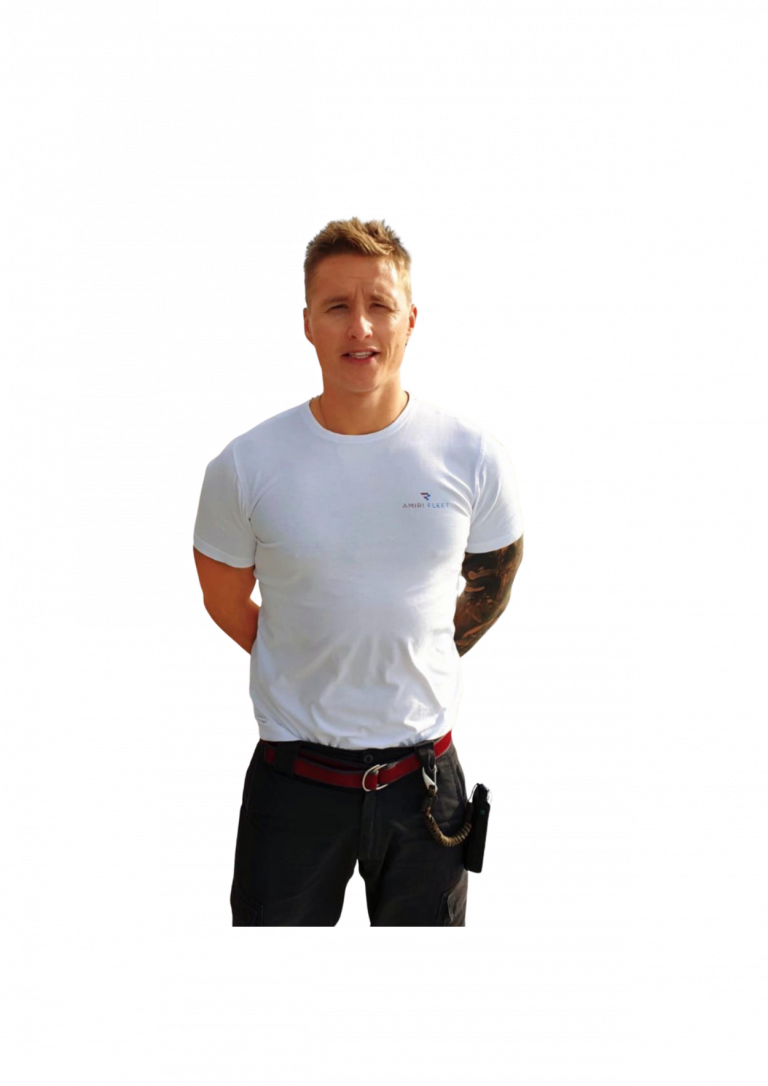
STCW Yacht Stewardess Training Europe
All stcw certificates and yacht training to get a yacht job as a stewardess (split, croatia).

Do you need help to become a Yacht Stewardess or a Yacht Deckhand ?
Become yacht crew by getting the right qualifications and certificates, how to start working on yachts .
Simply select your location and position above and get full access to Yachtiecareers Training programme. This gives you all mandatory STCW Basic Safety Certification with a training week in US or Europe.
How to Get into the Yachting Industry ?
Once you have the basic qualifications (STCW) you can register and apply through any of the reputable recruitment agencies – such as Nordic Yacht Support , Yachtiecareers or Yacrew.com. Another way is to “dock walk” looking for daywork. This involves quite literally walking the docksides where superyachts are berthed – such as Antibes, St Tropez, Palma and other Mediterranean ports, looking for daywork or temporary positions.
How Long Will it Take to Get a Yacht Job ?
The Superyacht industry is volatile, things can happen very quickly. You are dock walking and meet a Captain who, because a crew member has left and the yacht is sailing imminently, is looking for a dayworker/deckhand to start immediately, so be prepared to drop everything to come aboard.
On the other hand a Captain could be looking to recruit crew looking for long term employment (referred to in the industry as “longevity”). The Captain could be looking to build a particular type of person who will be able to work with other crew members as a team. It also depends on the time of year you apply.
What are the basic Entry Qualifications to become yacht crew ?
For employment on a commercially registered superyacht, the minimum requirement for all crew is basic safety training. STCW The basic safety training is known as Standards of Training, Certification and Watch keeping for Seafarers (STCW). This safety training was developed by the International Maritime Organisation (IMO). The full course comprises four modules/certificates:
- Personal Survival Techniques
- Fire Fighting and Fire Prevention
- Elementary First Aid
- Personal Safety and Social Responsibility
This is the STCW minimum qualifications to work on ships and on commercial yachts. When you book our Deckhand and Stewardess packages you also get an included STCW Basic Safety Training week in Croatia or Florida to get your full STCW certification and Basic Safety training.
Our packages above include every STCW certificate, Yacht CV and yacht qualifications you need to become a stewardess or deckhand to work as yacht crew on board.
Do you need help to star ? If you drop us a message and a Yachtiecareers Instructor will help you out !
We are usually very quick to respond!
Or get in touch where we usually hang out:
3 bookings left for free 50€. Use code “yachtie50” for 50€ free.
Get free yacht cv and yacht job offers
- Get Certified
- Superyacht Training

Why Choose IYT Worldwide for Your Certification?
The Superyacht industry offers exciting career opportunities around the globe and an IYT certificate offers the most internationally recognised maritime certification in the industry.
- No other yacht certification authority is as international recognised.
- No other yachting company offers such a diverse range of courses.
- Every IYT (COC) course requires a practical on-the-water examination.
- No other national yachting marine certification authority has an internationally recognised ISO quality management system. We are proud to be certified by the Canadian General Standards Board (CGSB)
- No other yachting organisation has been built by professional mariners.
- No other yachting company offers high security certificates with QR code, hologram, photograph and signature strip.
IYT has over 20 years of industry leadership and continues to lead the global maritime industry in certification and nautical standards.
- Recreational
- Privacy Policy & Terms Of Use
- Become a Partner School
- Register with IYT
- Find a School
- IYT E-Learning
- Certificate Renewal & Replacement
- Recreational Training Course Progression
- IYT Passport
- Crossover Opportunities
- Course Progression
- Course Progression Interior
- Dive Boat Training
- Forms And Docs
- Instructor Training
- Personal Watercraft Operator
- Dinghy Sailing Programme
- IYT Try Sailing
- IYT Introductory Sailing Skills
- IYT Day Skipper / Crew Sail
- International Crew
- International Flotilla Skipper
- International Bareboat Skipper
- International Flotilla Skipper Sail – Catamaran
- International Bareboat Skipper Sail – Catamaran
- International Certificate of Competency (ICC Certificate)
- Powerboat Skipper
- Yachtmaster Coastal (Power or Sail)
- Yachtmaster Coastal Sail – Catamaran
- Yachtmaster Offshore (Power or Sail)
- Yachtmaster Offshore Sail – Catamaran
- Yachtmaster Ocean
- Patron de Yates (Yachtmaster Coastal Spanish edition)
- Marine Communications (VHF-SRC)
- Small Powerboat and Rib Master (MCA Recognised)
- IYT Commercial Tender License Course
- Weather Master
- Navigation Master
- Master of Yachts Coastal/Mate 200 Tons (Power or Sail)
- Master of Yachts Limited (Power or Sail)
- Master of Yachts Unlimited
- Superyacht Chef
- Superyacht Deck Crew Course
- Superyacht Hospitality Training
- Boat Engineer Course (SCV Code for Vessels Operating in the Caribbean)
- IYT-MSWI BoatMaster Course
- Become An IYT School
- Upgrade Your School
- Find A School
- Course Levels
- Instructor Qualifications
- Vessel Requirements
- Vessel and Facility Requirements
- Unauthorised Schools and Other Entities
- Shipping & Delivery
- Government Approvals

- Mail: [email protected]
- Call Us: +44 (0) 23 8045 8737
RYA Yachtmaster Scheme MCA Examinations / Certificates of Competence
Introduction
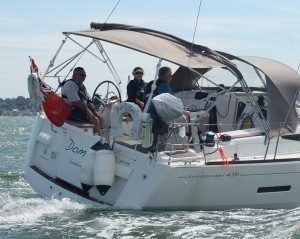
These sailing qualifications are recognised around the world as a clear mark of your sailing ability. Unlike a Day Skipper or Coastal Skippers Certificate there is no RYA Course or Syllabus to follow. Simply they are a test of your sailing ability conducted by an examiner, authorised to do so by the RYA.
Sailing Schools offer a preparation course running straight into the exam both of which normally run over a period of 7 days. It should be noted that these course are designed for you to brush up on some specific skills and areas of the exam that you will be tested on and not teach you how to sail. So you should have all the necessary experience prior to joining the course and be a confident sailor.
For some, Yachtmaster exams are taken just for a sense of achievement and offer a way of improving your sailing knowledge and techniques. For others wishing to embark on a career in the marine industry they are essential qualifications to achieve.
In this article we take a look at
- The RYA Yachtmaster Scheme
- Benefits of taking a 5 Day Preparation Course
Pre Exam Requirements
- Exam duration
- Converting between Sail & Power
- Working Commercially
Qualifications within the RYA Yachtmaster Scheme
Yachtmaster Coastal
Yachtmaster Offshore
Yachtmaster Ocean
Definitions
RYA Yachtmaster Coastal Skipper : Not to be confused with the Coastal Skipper course completion certificate, the Yachtmaster Coastal is the first of the Yachtmaster Scheme qualifications.
At this level you are deemed to have the knowledge needed to skipper a yacht on coastal cruises but not necessarily the experience needed to undertake longer passages.
During the exam you will be set tasks to demonstrate your ability to skipper a yacht and may be asked questions on all aspects of the RYA Cruising Scheme from Competent Crew to Coastal Skipper.
RYA Yachtmaster Offshore : The most widely recognised qualification and anyone holding this certificate is deemed to be competent to skipper a cruising yacht on longer passages but not more than 150 nm from harbour.
The examiner will be set tasks to test your ability as skipper of an offshore cruising yacht and you will be asked questions on any part of the syllabus for all courses except the Yachtmaster Ocean.
RYA Yachtmaster Ocean : Considered as the pinnacle within the sailing world and commonly taken by those seeking a career in the marine industry. You have sufficient experience to skipper a yacht on passages of any length in all parts of the world.
The exam consists of a written and oral test of your knowledge of ocean passage making including planning, navigation, worldwide meteorology, crew management, yacht preparation, maintenance and repairs. You will also be questioned on your sights taken at sea during an ocean passage.
RYA Yachtmaster Scheme
Certificates awarded within the RYA Cruising Scheme, such as the Day Skipper or Coastal Skipper are awarded by your instructor at the end of your course on the basis of continual assessment assuming you can demonstrate your abilities for the level you are at. There is a set syllabus and the courses are intended to teach you how to sail as well as improve your sailing skills.
MCA/RYA Certificates of Competence are awarded after a short practical assessment by independent examiners. They are designed to test your ability to skipper a yacht and are some of the most widely recognised and credible yachting qualifications available.
The RYA oversees the Yachtmaster Scheme on behalf of the MCA. Carefully chosen Yachtmaster examiners will assess both your sailing and skippering abilities.
Whilst Sailing Schools run a 5-day preparation course in advance of your examination aimed to bring you up to speed and prepare you for your exam. It is assumed that you already have the knowledge and the sailing skills required for the level you are being examined for.
Just like the RYA Cruising Scheme, you can join the Yachtmaster Scheme at any stage. You do not need to have completed any of the shore-based courses and nor do you need to complete a preparation course before taking your exam.
So if you are confident enough and sufficiently well prepared you can simply book an examiner through the RYA and take the test on your own yacht or one that you have chartered in.
However, most people appreciate that by taking a 5-day preparation course in advance of your exam will significantly increase your chances of passing.
Reasons for taking a Yachtmaster Prep Course
The whole purpose of a Yachtmaster Prep course is to prepare you for your exam and be challenged by an instructor who understands what an examiner is looking for. To find areas where you are weakest and allow you the opportunity to practice and develop your skills.
It is an advanced and intensive course and certainly no holiday and whilst you may be an experienced yachts person it is not often that you will practice the following
- Advanced skippering techniques
- Close quarter berthing in various and challenging conditions of wind and tide
- Picking up a buoy under sail
- Weighing or lowering anchor under sail
- Boat handling in confined areas under sail
- Man overboard recovery techniques
- Advanced Navigation
- Blind Navigation
The course is largely a practical course and designed to hone your sailing and boat handling skills. Whilst you will cover certain areas of theoretical knowledge it is important that you are fully up to speed with regards to the following before attending the course.
- International Regulations for Preventing Collisions at Sea
- Meteorology
By attending a course you will undoubtedly learn a new set of skills and it will importantly get you into the mindset so that you are fully prepared to take the exam.
Format of the Course & What to Expect
Courses run for 5 days starting on a Friday evening. The exam follows immediately after the course and can run for up to 48 hours depending on the level and number of candidates.
We restrict the number of students down to a maximum of 4 persons to give everyone as much practical hands-on time as possible. The courses are run on board one of our 36 – 39-foot sailing yachts which are based in Mercury Yacht Harbour on the River Hamble. The courses are run within the Solent where you can practice navigation, pilotage and boat handling in a whole different range of different tidal and weather conditions. Ultimately there is little benefit in sailing in a straight line so it is highly unlikely you will venture out of the Solent opting to focus more on the entering and exiting as many ports as possible.
The first evening is all about getting to know the other students and your skipper. It is unlikely that you will leave the marina that night but you will cover certain safety briefings so as to maximise the available time the following day.
During the next 5 days, you will hop from port to port within the Solent. You will live onboard for the full five days, each of you will take it in turns to be the skipper of the day and take responsibility for the crew and general running of the yacht.
Whilst there is no set syllabus to follow there are certain standard areas that the instructor will cover in order to prepare you for the exam. The rest of the course, however, is up to you and everyone else on board to determine based on areas of weakness and what needs to be practised.
You will focus on areas of boat and sail handling and be encouraged to push yourself outside of your comfort zone so as to build up your confidence prior to the exam.
We aim to end the course mid-afternoon on Wednesday so that you have some downtime to relax and calm any nerves prior to the examiner joining on Wednesday evening.
Format & Nature of the Exam
If you are booking a Yachtmaster Preparation course through a Sailing School then the School will arrange an examiner for you.
You will be required to prepare a passage plan for a fictitious sailing trip in advance of the examiner joining the yacht. You will be asked to do this under exam conditions and without the assistance of your instructor or other students. The examiner will give your instructor basic details of a trip from which you will need to create a detailed passage plan. This will get collected by your examiner at the beginning of your exam and be expected to answer questions on the reasoning of your passage plan during the course of your exam !!
It is highly likely that your examiner will want to set off straight away in order to carry out part of the assessment which will take place at night, so be prepared !! The examiner will nominate one person, in turn, to act as skipper and to take responsibility for the yacht. And whilst the obvious pressure will be on this person, at the same time the examiner will be quizzing and watching everyone else to see how you all behave and interact onboard.
You will moor up or anchor somewhere for a few hours overnight before continuing with the assessment the next day. But don’t forget that you are being continually assessed so stay on your guard at all times.
Whilst this is naturally a pressured environment the examiner is there to find out what you know and ultimately wants you to pass. They will do all they can to relax and encourage you to demonstrate that you have the right abilities to pass, so relax and try to act as normally as you can.
Depending on the number of candidates the exam can take anything up to 48 hours. At the end of the exam, you will be told immediately whether you have been successful or not.
Exam Fees are normally payable directly to the examiner and in addition to the course fee charged by the sailing school.
Yachtmaster Offshore Exam Fee – £210 Yachtmaster Coastal Exam Fee – £181
Min Age… 17 years
Sea time…
- 800 miles logged within 10 years of the exam
- 30 days living onboard
- 2 Days as Skipper
- 12 Night Hours
Certificates…
- Radio Operators Licence
- Valid First Aid Certificate
For holders of the Coastal Skipper Practical Course Completion Certificate the sea time is reduced to
- 20 days living onboard
- 12 night hours
- 2 days as skipper
Half the qualifying miles must have conducted in tidal waters
Min Age… 18 years
- 2,500 miles logged within 10 years of the exam
- 50 days living onboard
5 Passages over 60 miles
- 2 of these passages as Skipper
2 of these passages having involved sailing overnight 5 Days experience as skipper
All candidates must
Hold a RYA/MCA Yachtmaster Offshore Certificate of Competence
Have completed, as skipper or mate of a yacht a qualifying passage which meets the following criteria
a) Candidate fully involved in the planning of the passage, including selection of the route, the navigation plan, checking the material condition of the yacht and her equipment, storing with spare gear, water and victuals and organising the watch keeping routine.
b) During the passage a minimum join stop distance of 600 miles must have been run by the log, the yacht must have been at sea continuously for at least 96 hours and the yacht must have been more than 50 miles from land while sailing a distance of at least 200 miles.
c) Hold First Aid qualification as for Yachtmaster Offshore
Exam Duration
The exam will take about 6 to 10 hours for one candidate and 8 – 14 hours for two.
The exam will take about 8 to 12 hours for one candidate and 10 – 18 hours for two.
The exam consists of a written and oral test.
Own Boat Exams
As well as saving money, if you own your own boat then it is logical that you would prefer to be examined on a yacht that is familiar to you.
There are a few requirements
- Not less than 7 meters
- Sound & Seaworthy Condition
- Equipped to standards set out in the RYA book Cruising Yacht Safety C8
- Up to date charts and navigational publications
- Efficiently crewed as the examiner will not take part in the management of the yacht during the exam
To book an exam simply contact the RYA.
Converting between Sail and Power
Holders of a Yachtmaster Coastal or Yachtmaster Offshore certificate may take a conversion exam from sail to power or power to sail. Please note that the exam for converting from power to sail may take slightly longer.
The exam will take about 3 hours and you may be asked on any aspects of the syllabus but will concentrate on those section which are notably different between sailing vessels and power boats.
Mileage must be in the type of vessel you are converting to and must be within 10 years prior to the exam. Half of the qualifying sea time must have been conducted in tidal waters.
Yachtmaster Coastal Conversion Exams
- Minimum 400 miles
- 12 Days living onboard
Yachtmaster Offshore Conversion Exams
- Minimum 1250 miles
- 25 Days living onboard
- 3 Days as Skipper
- 3 Passages over 60 miles including 1 overnight and 1 as Skipper
Commercial Endorsements
If you are planning on working commercially then the use of Yachtmaster Coastal, Yachtmaster Offshore and Yachtmaster Ocean certificates is permitted for the skippers of these vessels provided that the certificates are commercially endorsed. Commercial endorsements are valid for 5 years.
How to obtain a Commercial Endorsement
You will need to send your Yachtmasters Certificate to the RYA with the following
- Medical Fitness Certificate – Link to Medical Fitness Form
- Attend a sea survival course
STCW Endorsements
Standard of Training and Certification of Watchkeepers
For larger vessels and for certain administrations you may be required to hold an STCW 95 endorsement. It is commonly required if you are working outside of the UK on non UK flagged vessels.
You will be required to attend 4 courses
- STCW Personal Survival techniques
- STCW Personal Safety and Social Responsibilities
- STCW Elementary First Aid
- STCW Fire Fighting and Fire Prevention
Renewing your STCW Endorsement can be achieved by sending the following to the RYA
- A covering letter requesting the STCW endorsement
- Your original Certificate
- New Passport Photograph
- Evidence of completion of the STCW course
- Fee payable to the RYA
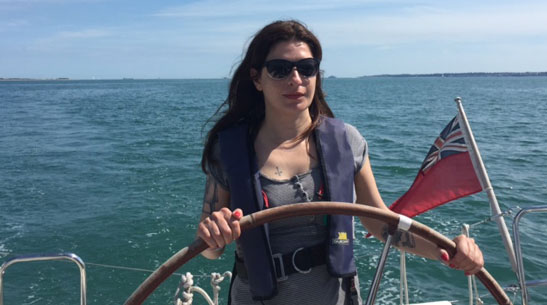
Universal Yachting Ltd
- Terms & Conditions
- Privacy Policy
- DATA REQUEST
- Dufour Yachts
- Boats For Sale
- Yacht Charter
- Marine Services

Universal Yachting Ltd: Mercury Yacht Harbour, Satchell Lane, Hamble, Southampton, Hampshire SO31 4HQ
Call Us: +44 (0) 2380 458737 Mail: [email protected]

Engineering
Engineer your future.
If you’re looking for an exciting career that will allow you to explore the world, but will also provide opportunities on land, a yacht engineer could offer the perfect solution. You’ll be responsible for maintaining and servicing all of the yacht’s on-board systems and engines, as well as all outgoing tenders and toys.

Approved Engine course 1 (AEC1)

Approved Engine course 2 (AEC2)
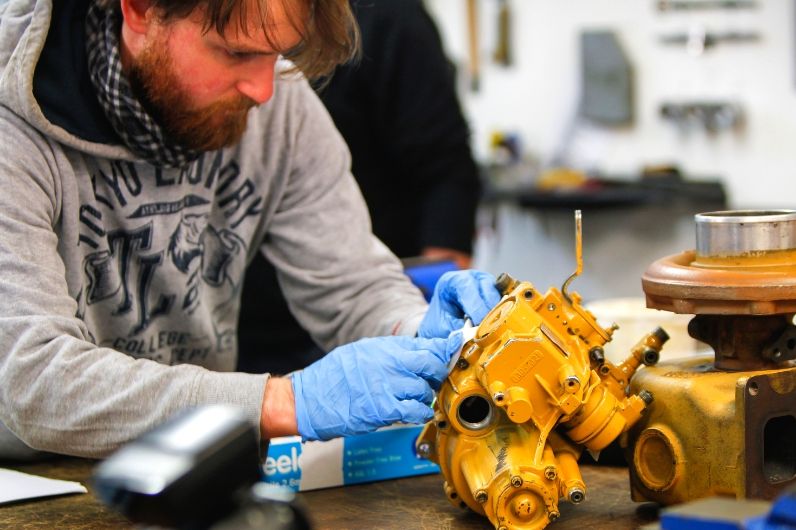
Yachting Engineering programmes
Our Yacht Engineering courses will give you the internationally recognised skills and qualifications you need to start your career as a yacht engineer, providing an understanding of engineering disciplines, as well as the hands-on skills you’ll need.
Our programmes include:
- RYA Diesel Engine Maintenance – an introduction to maintaining diesel engines and diagnosing basic faults.
- Approved Engine Course 1 (AEC1) – the next step in hands-on training and theoretical knowledge of diesel engines.
- Approved Engine Course 2 (AEC2) – leading on from the AEC1, providing practical hands on training and theoretical learning across a range of auxiliary systems.
For full details of UK requirements for engineer officers on Small Vessels please see MIN 524 (M+F).

Expert yacht engineering training
Delivered by qualified yacht engineers and taught in our purpose-built training workshops, our professional Yacht Engineering courses give you the skills and knowledge you need to build an engineering career at sea.
Where can these courses take me?
Allowing you to gain the internationally recognised skills and MCA qualifications for a rewarding career as an engineering officer, we offer the courses needed to progress from an assistant engineer to a chief engineer on modern superyachts.
Alongside these specific engineering courses you may also need the STCW Basic Safety Training if you are looking for a career onboard vessels above 24 meters.
Share your #SeaChangeStories
You can share your #SeaChangeStories across social media, please email us with your story and remember to send us your photos too.
Our flexible training works around your busy schedule.
Speak to an advisor on +44 (0)1983 203001 or email us
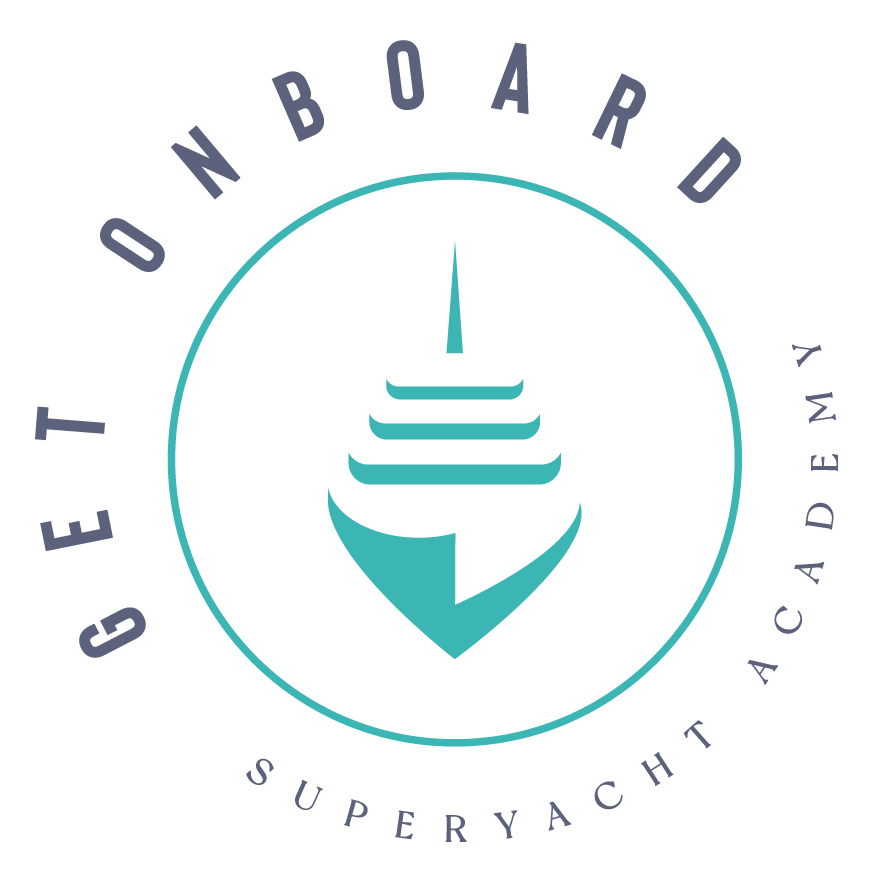
Get Onboard
Superyacht Training
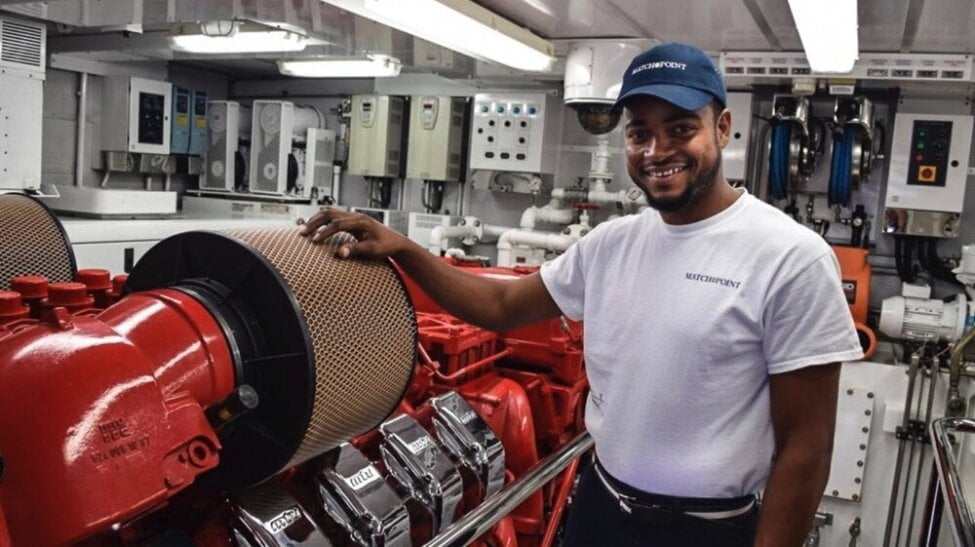
How To Become A Superyacht Engineer
Thinking about pursuing a career as a superyacht engineer we show you how….
We frequently receive emails from students asking us, “How do I become a Superyacht Engineer?” “Are my trade skills transferable?” “What yacht training must I complete?” and “ What qualifi cations do I need? “. In this article, we break down these questions and explain exactly what steps you need to follow in order to become a super yacht engineer.
What is a Superyacht Engineer?
The crucial part of any yacht engineer job description is maintaining the mechanical and electrical operations of the yacht. The duties of an engineer range from maintaining and servicing generators, jet skis and powerboats to replacing oil filters, repairing water makers, monitoring air conditioning, AV, IT and even unblocking toilets. Whether you are new to the industry, or have worked on land as a plumber, carpenter or tradesman, anyone can become a super yacht engineer, provided they have completed the necessary courses.
The Engineering Department onboard a super yacht is quickly becoming one of the most desirable departments to work due to the rotation packages as well as the transferable skills land-based skills such as plumbing and carpentry . Senior Engineers are highly respected and are of a similar rank to the Captain as the yacht is unable to manoeuvre without them.
What are the Superyacht Engineering Courses and Qualifications?
Yacht engineering qualifications were introduced in February 2001 to provide an industry standard system of certification. The system allows all those who wish to pursue engineering careers to do so, no matter what their previous training is.
The Maritime and Coastguard Agency (MCA), have set out the basic course progression you will need to follow in order to work your way up from a Junior Engineer, to Chief Engineer onboard. This involves completing the AEC , MEOL and Yacht 4, 3, 2 and 1 qualifications.
The qualifications you require include:
A mechanical, diesel or electrical background
Strong project management skills
Inventory maintenance experience
Understanding of different softwares
The Approved Engine Course (AEC) – the base minimum for superyacht engineers who wish to work on yachts over 24m LOA
The Marine Engine Operators Licence (MEOL)
Depending on the size of yacht you want to work on, you may need the following licenses.
– Yachts <200GT with up to 1500Kw in propulsive power:
Small Vessel Second Engineer (formerly Y4)
– Yachts <500GT with up to 3000Kw in propulsive power:
Small Vessel Chief Engineer (formerly Y3)
– Yachts <3000GT with up to 9000Kw in propulsive power:
Small Vessel Chief Engineer (formerly Y1/2)
or Officer of the Watch (Engineering) – usually gained from the commercial shipping industry
– Unlimited license:
Engineer Officer of the Watch – Unlimited
What is a typical yacht engineer salary?
Starting out as a 3rd or junior engineer, you can expect to earn anywhere from $3,000 to $6,500 per month, and as you move up the ranks to 2nd engineer this increases from $5,000 to $8,000.
In the top position, a chief yacht engineer salary can be anywhere between $8,500 to $13,500, depending on the size of the yacht, so if you want the big bucks then the engineering department is the way forward!
There is no average yacht engineer salary, with roles varying so much from yacht to yacht, however these figures are a guideline for what you can expect to earn. It is worth noting that obtaining your engineering qualifications takes time and is an expensive process, so be sure you are ready to commit to long hours of studying ahead. Check out our article on yachting salaries for more information.
What are the super yacht training package do you offer?
Once you have completed your STCW course and other basic safety training, you can look to expand your skill set to work on board in the super yacht industry.
We have put together an extensive Superyacht Engineering training program which is an ideal entry level introduction for those seeking to work on a yacht as an Engineer. Due to the longevity of the engineering department onboard, this is an excellent avenue to explore if you are looking for real career progression, rather than a gap year experience.
- Proficiency in Designated Security Duties (PDSD)
- RYA Powerboat Level 2
MCA Approved Engine Course (AEC1)
Interested in learning more?
If you are thinking about starting out as an engineer, you can read more about our Superyacht Engineer Course package.
You can complete these courses with us at Get Onboard Superyacht Academy in Cape Town. If you are interested in learning more, why not speak to one of our expert consultants who will happily answer any additional questions you may have.
Needing more?
Error: Contact form not found.
RYA/MCA Online
1. what are the basic requirements you need to be eligible to work in the yachting industry, 2. what is the stcw and why do i need it, 3. what is the eng1 medical certificate, 4. what land based experience will help me find a super yacht job, 5. what are the different departments onboard, 6. what crew training is required for me to work as a junior deckhand.
- Yachtmaster/Coastal Skipper Theory
- Yachtmaster/Coastal Practical
- Specialist Super Yacht Training Course (Deck Hand Training Course)
- RYA Power Boat Level II
- RYA Personal Watercraft Course
- RYA Competent Crew Certificate
- RYA Day Skipper Theory and Practical Certificates
- VHF Radio Operator’s License
7. What crew training is required for me to work as a junior stewardess?
- Stewardess Course
- MCA Food Safety Level 2
8. How do I book my training courses?
9. how do i get my first job on a yacht, 10. are these courses worth it, or am i just wasting my money, 11. will i get hired for my first job from south africa, 12. what is daywork, 13. what are the best locations to get a yacht job, 14. how much can a motor yacht stewardess or deckhand earn, 15. what are the negatives of working on a yacht, 16. what are the positives of working on a yacht, 17. is working on a super yacht for everyone, 18. what is the minimum age to work on a yacht, 19. is accommodation provided when i am completing my yacht training in cape town.

IMAGES
VIDEO
COMMENTS
View your RYA certificates online by registering for a free MyRYA account. The RYA's training courses and qualifications are recognised and respected all over the world. With more than 2,400 recognised training centres across 58 different countries and more than 100 courses, there's something for every age, interest and ability.
To begin your career in yachting, certain qualifications and certifications are essential. These not only ensure compliance with regulatory standards but also prepare you for the unique challenges of life at sea. Certification Overview. Before you work on a yacht, you must obtain specific certifications that are recognized globally.
We offer a full range of entry-level training courses in Antibes and Palma. The five-day STCW Basic Safety Training package comprises the MCA-accredited modules: Personal Survival Techniques, Fire Prevention and Fire Fighting, Elementary First Aid and Personal Safety and Social Responsibilities. Together, they form an essential programme of pre ...
Remember to create a professional CV and be prepared for interviews, as competition in the yachting industry can be fierce. 2. Essential Skills and Certifications for Aspiring Yachties. Entering the world of yachting requires a unique set of skills and qualifications, which are essential for ensuring a successful career.
Getting out on the water for the first time can be a daunting task, and navigating through the range of sailing courses and qualifications can be overwhelming. In this blog, we are going to explain the different yachting schemes available around the world (ASA, RYA etc), the qualifications they can offer, and discover the best path for you.
However, quality yacht crew training courses are essential, and often required, for life on board. Whether it's your first job in the maritime industry or you're looking to progress in your yachting career, the right crew qualifications ensure crew members hold the essential skills that may be needed in an emergency at sea.
Qualifications required to work on board a yacht. All crew, regardless of their position on board, need to have completed the STCW Basic Safety Training along with obtaining a recognised Seafarers medical certificate, the most popular being the ENG1 which is issued by an MCA ( Maritime and Coastguard Agency) professional medic.
A: A yacht crew certification is a qualification or endorsement that verifies an individual's competence and skills in performing specific job roles within the yachting industry. Q: Why do I need a yacht crew certification? A: Yacht crew certifications are essential for securing employment within the yachting industry.
IYT operates more boating courses with more government approvals through more schools, in more countries and in more languages than any other boating organization in the world. We are proudly ISO 9001:2015 approved. International Yacht Training Worldwide is the global leader in International Certificate of Competence, Superyacht Crew training ...
Chief Engineer (Yacht 4) - Less than 200GT and less than 1,500kW (1) Chief Engineer (Yacht 3) - Less than 500GT and less than 3,000kW (0) Chief Engineer (Yacht 2) - Less than 3,000GT and less than 3,000kW (0) Training courses for yacht crew and those who are looking for jobs on yachts: STCW, deck, engine, interior, culinary, etc.
Go to a superyacht marina. 1. Have the right attitude. Along with gaining the correct qualifications to prove your competence, to become a Yachtie, you must have certain characteristics to thrive in this industry. Yachties have to be well presented, articulate, know how to take orders, and be able to work hard, all with a smile and enthusiasm.
Here are the steps you can take to become a Yacht Master in the RYA: Gain experience: You will need to have a certain amount of experience before you can start working towards your Yacht Master qualification. This usually involves logging a minimum number of sea miles and completing a certain number of hours of helm time.
This is the STCW minimum qualifications to work on ships and on commercial yachts. When you book our Deckhand and Stewardess packages you also get an included STCW Basic Safety Training week in Croatia or Florida to get your full STCW certification and Basic Safety training. Our packages above include every STCW certificate, Yacht CV and yacht ...
Highlight your yachting qualifications and certifications: List your STCW Basic Safety Training, medical certificate, and any additional courses or certifications relevant to the yachting industry (e.g., interior course, wine knowledge, etc.). This shows your potential employer(s) that you're serious!
The STCW yacht qualification is the Standards of Training, Certification and Watchingkeeping (STWC) course and it's a compulsory requirement for any seafarer employed at sea. The STCW Basic Safety Training yacht qualification comprises five modules which take eleven days to complete. The modules are personal survival techniques, firefighting ...
The Superyacht industry offers exciting career opportunities around the globe and an IYT certificate offers the most internationally recognised maritime certification in the industry. No other yacht certification authority is as international recognised. No other yachting company offers such a diverse range of courses.
b) During the passage a minimum join stop distance of 600 miles must have been run by the log, the yacht must have been at sea continuously for at least 96 hours and the yacht must have been more than 50 miles from land while sailing a distance of at least 200 miles. c) Hold First Aid qualification as for Yachtmaster Offshore. Exam Duration
All crew need STCW basic safety training, a five-day course, and an ENG1 medical certificate, and some yachts may also require certification in Food Safety & Hygiene, a one-day course. On top of these necessities, there are numerous options for yacht-specific interior training, but many chief stews, like Robert, prefer to teach on the job ...
Established in 1885, the Royal Yachting Association ( RYA) is the UK national body for all forms of boating, including dinghy and yacht racing, motor and sail cruising, RIBs and sports boats, powerboat racing, windsurfing, inland cruising and narrowboats, and personal watercraft. RYA training is forward thinking and designed for whatever level ...
Yachting Engineering programmes. Our Yacht Engineering courses will give you the internationally recognised skills and qualifications you need to start your career as a yacht engineer, providing an understanding of engineering disciplines, as well as the hands-on skills you'll need. Our programmes include:
The qualifications you require include: A mechanical, diesel or electrical background. Strong project management skills. Inventory maintenance experience. Understanding of different softwares. The Approved Engine Course (AEC) - the base minimum for superyacht engineers who wish to work on yachts over 24m LOA. The Marine Engine Operators ...